Shows

Sense of MindThe Neuroscience of Emotions: How to Control FeelingsYou are a living organism. That’s obvious, but this simple fact helps explain one of the most profoundly important aspects of your life: your emotions. In fact, it teaches you how to control your emotions.
--
Please support this channel by signing up for Sense of Mind's Patreon and get bonus content every month: https://www.patreon.com/senseofmind
You'll get:
- Exclusive videos only for Patrons
- Access to exclusive monthly livestreams
- Written (blog post) versions of all new videos, including this one!
...
2024-09-0722 min
Sense of MindTime, Music, and The Brain (The Social Brain - Patreon ep 5)In this episode, we discuss the neuroscience of time, music, free will, emotions, memory, the self, and what we've learned from our research on these topics.
If you’re reading this, then you’re watching the public version of this video, so if you want to watch the second half, go to https://www.patreon.com/thesocialbrain and sign up for the “Premium” tier. You’ll get access to every exclusive Patreon-only episode of The Social Brain!
--
Please support this channel by signing up for Sense of Mind's Patreon and get bonus content every month: htt...
2024-07-0825 min
Sense of MindThe Neuroscience of Exhaustion: How to Stay MotivatedWe've all experienced the exhaustion of mental fatigue. If you work long enough and hard enough on a cognitively demanding task, you'll eventually lose motivation and focus. Worse yet, burnout is right around the corner. This video is a deep dive into the neuroscience of mental fatigue and how to stay motivated.
If you value my work, please support it by going to https://www.patreon.com/senseofmind
(If you do, you'll also get exclusive videos, livestreams, and blog posts!)
--
Sources:
- Kok, A. (2022). Cognitive control, motivation and...
2024-06-1725 min
Sense of MindHuman Evolution & Brain Development (Preview of The Social Brain - Patreon ep 4)In this episode of The Social Brain, we discuss human brain evolution and development, and what we've learned from our research into these topics.
The first half of this episode is available for everyone, but if you want to see the whole episode, sign up for The Social Brain's Patreon page at the Premium tier: https://www.patreon.com/thesocialbrain
(Please note that this is separate from Sense of Mind's Patreon page, because Taylor and I share the revenue from The Social Brain's page.)
--
Please support this channel by signing...
2024-05-1324 min
Sense of MindThe Neuroscience of Resilience: How to Bounce BackResilience is not just about how your brain withstands adversity, but also how it becomes stronger as a result. This is a deep dive into the neuroscience of resilience and science-based strategies for how to build resilience.
If you want to get exclusive videos, blog posts, and livestreams AND help me keep creating videos like this one, please sign up for Sense of Mind's Patreon: https://www.patreon.com/senseofmind
Sources:
I want to make sure to credit a 2020 review article called "An affective neuroscience model of boosting resilience in adults" by Golnaz...
2024-05-1032 min
Sense of Mind3 Steps to Rewire Your Brain for Better SleepTo form good habits and break bad ones, you have to rewire your brain’s dopamine system. In this episode, I'll explain how to do that by talking about how you can create healthier habits around sleep.
00:00 Step 1
03:00 Step 2
04:26 Step 3
07:00 How to ACTUALLY change your habits
--
Please support this channel by signing up for Sense of Mind's Patreon and get bonus content every month: https://www.patreon.com/senseofmind
You'll get:
- Access to exclusive monthly livestreams
...
2024-04-0609 min
Sense of MindBeat Procrastination with 6 Science Based ToolsToo often, we put off important tasks even though we know we'll be worse of for it. In other words, we procrastinate and we end up suffering in our professional and personal lives. Yet, in this video, we'll see that there are several neuroscience-based ways to stop yourself from procrastinating.
Link to Patreon only video #1: "Mind the Gap": https://www.patreon.com/posts/mind-gain-98420924
--
Please support this channel by signing up for Sense of Mind's Patreon and get bonus content every month: https://www.patreon.com/senseofmind
You'll get:
2024-03-0414 min
Sense of MindThe ADHD Brain - Beyond Distractions (The Social Brain ep 35)You've noticed it—the drift of your attention, the challenge of staying on task. We all experience this but for some of us this can reach extremes and fall under the category of ADHD, a complex neurological condition that's often misunderstood. But what really is ADHD?
In this episode, we're diving deep into the neuroscience of ADHD. We'll explore the latest research that sheds light on how ADHD brains work, the innovations in treatment and management, and most importantly, how those with ADHD can leverage their unique strengths.
⏬ ⏬ ⏬
Help us keep this show alive AN...
2024-03-011h 33
Sense of MindA Balanced Mind: The Default Mode & Other NetworksHave you ever noticed that when you aren’t doing anything specific, you often start thinking about yourself, your past, other people, or maybe your future? That’s your brain’s default mode network in action. And when your attention gets pulled back to the task you’re working on, a whole other set of networks comes online.
In this episode, we’ll explain what these networks do, and why they’re so important for optimizing cognition.
⏬ ⏬ ⏬
Help us keep this show alive AND get bonus content by going to: https://www.patreon.com/thesocialbrain...
2024-02-121h 10
Sense of MindFrom Panic to Peace: The Brain's Stress Response (The Social Brain ep 33)Feel that heartbeat rush, that quickened breath? That's stress, a staple of modern life. Our bodies react to today's pressures as though facing ancient threats. Stress, often mentioned casually, shows up in many forms: relationship tensions, financial worries, or deadline panics.
Once key for survival, this response now springs from our thoughts and lifestyle, linking our physical and mental experiences. How does it impact our health and well-being?
In this episode, we dive into stress's science and mystery. We'll examine how this primal response adapts to modern life and how to manage its effects. It's...
2024-01-291h 08
Sense of MindWorry and Peace: Easing The Brain’s Anxiety (The Social Brain ep 32)At first glance, it seems silly to fear things that haven’t happened or may never happen. What is the point of getting worked up over something you may have no control over? Odd as it seems, the truth is, most of us do this on a regular basis. It’s a normal process that occurs in the brain and one you are probably deeply familiar with: anxiety.
In this episode, we’ll see that while not all anxiety is bad, it very often causes us to suffer unnecessarily. We’ll see how this occurs i...
2024-01-151h 11
Sense of MindAre Your Choices Predetermined? Neuroscience + Free Will (The Social Brain ep 31)What does neuroscience have to say about free will? Is free will in conflict with the laws of physics or observations from neuroscience? What does "free will" even mean? These are ancient philosophical questions, but they have important implications for our daily lives, from how we make choices to how we can improve ourselves. In this episode of The Social Brain, we'll discuss the fascinating science and philosophy of free will from a neuroscientific perspective.
⏬ ⏬ ⏬
Help us keep this show alive by going to: https://www.patreon.com/thesocialbrain
🧠 👕 ☕Want cool neuroscience gear? Check out our...
2023-12-211h 12
Sense of MindInterpersonal Conflict and the Brain (The Social Brain ep 29)Have you ever brushed relationship conflict under the rug, hoping it would just vanish? We've all been there. However, this episode sheds light on why conflict doesn't have to be purely negative, as we often make it out to be.
⏬ ⏬ ⏬
Help us keep this show alive by going to: https://www.patreon.com/thesocialbrain
🧠 👕 ☕Want cool neuroscience gear? Check out our coffee mugs, t-shirts, stickers, and more:
https://www.youtube.com/channel/UC610T-s8gpOVDtAVXTZ35FQ/store
--
Related Content:
- Previous Episodes of The Social Brain...
2023-10-261h 07
Sense of MindThe Power Struggle: Neuroscience of Status and Hierarchies - The Social Brain ep 28In this episode, we delve into power dynamics and explore the ways in which power and status affect our brain and our health. We uncover the hidden influences that hold sway over our relationships, our decisions, and our well-being.
⏬ ⏬ ⏬
Help us keep this show alive by going to:
https://www.patreon.com/thesocialbrain
🧠 👕 ☕Want cool neuroscience gear? Check out our coffee mugs, t-shirts, stickers, and more:
https://www.youtube.com/channel/UC610T-s8gpOVDtAVXTZ35FQ/store
--
Related Content:
- Previous Episodes of The Social Brain: https...
2023-10-051h 13
Sense of MindThe Science of Value: Decoding The Neuroscience of Decision Making and NeuroeconomicsYour decisions rule your life. Your brain is the source of your decisions. So, if you can understand the neuroscience of decision making, then you should be able to make better decisions that improve your life in the future. One key component of decision making, as emphasized by the field known as “neuroeconomics,” is the process of valuation, or how your brain determines how much you value something. This video will explain the science of value, helping to decode the complex neuroscience of decision making and neuroeconomics. At the end, I’ll describe 3 neuroscience based strategies for avoiding cognitive biases...
2023-10-0446 min
Sense of MindNeuroscience of Persuasion + Strategies for Changing Minds and Behaviors (The Social Brain ep 27)How does the brain persuade and how does it become persuaded? Can you use neuroscience to persuade others? In this episode, we unravel the neuroscience and psychology of persuasion. We draw on the work of Drs. Robert Cialdini, Emily Falk, and John Cacioppo to explore the science behind influencing behavior and facilitating positive social interactions.
⏬ ⏬ ⏬
Help us keep this show alive by going to: https://www.patreon.com/thesocialbrain
🧠 👕 ☕Want cool neuroscience gear? Check out our coffee mugs, t-shirts, stickers, and more: https://www.youtube.com/channel/UC610T-s8gpOVDtAVXTZ35FQ/store
--
Ch...
2023-09-221h 05
Sense of MindThe Neuroscience of Empathy: Mimicking the Minds of Others (The Social Brain ep 26)Empathy is powerful. It’s like neural mimicry, a way for our brains to synchronize and understand each other emotionally. This is what makes empathy such a powerful social force binding people together and allowing us to care for others.
But what is empathy? How does empathy work in the brain? What is the difference between cognitive empathy, affective empathy, sympathy, theory of mind and compassion? What happens when someone has no empathy at all? How can you enhance and increase your own empathy?
In this livestream episode of The Social Brain we'll answer all of...
2023-09-071h 12
Sense of MindThe Brain Under Covers: The Science of Sleep (The Social Brain ep 25)Sleep repairs your brain, enhances your memory and cognition, improves your immune system, and generally makes you feel better. But how does sleep do all this? Throughout this episode, we’ll dive into the neuroscience of sleep to answer these questions and more.
Support The Social Brain on Patreon: https://www.patreon.com/thesocialbrain
Prefer to listen? Check out the podcast version of The Social Brain: https://rss.com/podcasts/thesocialbrain/
--
Related Content:
- Andrew's video on sleep: https://youtube.com/live/aJWXEPisq88?feature=share
- Pr...
2023-08-171h 08
Sense of MindUsing the Past to Predict the Future: A New Neuroscience of Memory (The Social Brain ep 24)Groundbreaking research in neuroscience has revolutionized our understanding of memory. Join us on this episode of The Social Brain as we unpack some of the latest theories and research on the how the brain learns and remembers.
Support The Social Brain on Patreon: https://www.patreon.com/thesocialbrain
Prefer to listen? Check out the podcast version of The Social Brain: https://rss.com/podcasts/thesocialbrain/
--
Related Content:
- Previous Episodes of The Social Brain: https://www.youtube.com/playlist?list=PLC92ipyM9i9Ilc6kpe4eer-8PVOfF-jdW
2023-08-101h 02
Sense of MindUs vs Them: The Tribal Brain (The Social Brain ep 22)In this episode, we unravel how our brains evolved to foster an "us vs them" mentality, often leading to biases and conflicts in today's interconnected society. We dive into the neuroscience behind these behaviors, the role of hormones, and how different types of 'thems' emerge based on the stereotype content model. This discussion also presents strategies to override these unconscious categorization processes.
Support The Social Brain on Patreon: https://www.patreon.com/thesocialbrain
Prefer to listen? Check out the podcast version of The Social Brain: https://rss.com/podcasts/thesocialbrain/
--
...
2023-07-111h 01
Sense of MindVisualization & The Brain: Using Neuroscience to Boost Performance (The Social Brain ep 21)
This episode delves into the fascinating overlap of neuroscience, visualization, and mental imagery, empowering us to understand and harness our mind's power to transform our lives. We uncover how short, repeated visualization sessions can aid skill acquisition, how goal-setting can be enhanced with neuroscience-backed approaches, and how visualization can even ameliorate mental health.
Support The Social Brain on Patreon: https://www.patreon.com/thesocialbrain
Related Content:
- Previous Episodes of The Social Brain: https://www.youtube.com/playlist?list=PLC92ipyM9i9Ilc6kpe4eer-8PVOfF-jdW
- Dr. Andrew Huberman...
2023-06-271h 03
Sense of MindConnecting the Mind and Body: Collective Cellular Intelligence (The Social Brain ep 20)Dive into the fascinating world of cybernetics and discover how our bodies function as a complex control hierarchy, with the mind serving as the governor. Learn about cellular communication, the evolution of the nervous system, and the parallels between our bodies and societal structures. This discussion will redefine your understanding of your body and mind, inviting you to consider what kind of biological government you want to be. Tune in to unlock the massive potential of your mind and the intricacies of the systems that constitute your existence.
Support The Social Brain on Patreon: https://www.patreon...
2023-06-151h 04
Sense of MindAMA #1: Answering Your Brainy Questions! (The Social Brain ep 19)You asked, we're here to answer! On this episode of The Social Brain, we will be addressing questions about all things neuroscience sent to us by viewers like you. Be sure to join in and leave any questions you have for future AMA episodes in the comments or the live chat!
Support The Social Brain on Patreon: https://www.patreon.com/thesocialbrain
Prefer to listen? Check out the podcast version of The Social Brain: https://rss.com/podcasts/thesocialbrain/
You can find the questions we answered in the comments sections of these posts:
2023-06-081h 04
Sense of MindHappiness Secrets from Neuroscience: The Pleasure Cycle and the Path to EudaimoniaDiscover true happiness through the lens of neuroscience. Dive into the fascinating world of hedonic hotspots, the pleasure cycle, and the neurological underpinnings of eudaimonia. Learn how the brain's default mode network may connect eudaimonic and hedonic happiness to the self and explore Drs. Morten Kringelbach and Kent Berridge's hypothesis on the role of optimal metastability in achieving a state of well-being, purpose, and flow.
In this video, you'll also gain practical strategies for increasing happiness in your daily life. Understand the importance of defining your values, engaging in activities that promote pleasure, and pursuing eudaimonia through...
2023-05-0514 min
Sense of MindCaffeine's Impact on the Brain: The Neuroscience Behind Your Morning BoostEver wondered how caffeine keeps you awake, alert, and motivated? Discover the science behind this amazing molecule and how it affects your brain! In this video, I dive into the world of dopamine and uncover the unique way caffeine enhances dopamine signaling. Learn the surprising link between caffeine and other addictive substances, and how this mind-boosting compound can be both a friend and foe. Let’s explore the fascinating world of #caffeine!
Please support this channel by signing up for Sense of Mind's Patreon and get bonus content every month: https://www.patreon.com/senseofmind
- Access to...
2023-04-2111 min
Sense of MindThe 7 Emotion Circuits: RAGE, FEAR, GRIEF, LUST, CARE, SEEKING, and PLAY (Jaak Panksepp's theory)In this episode, we'll delve into the fascinating science of emotions and explore the seven basic emotions that are hypothesized by neuroscientist Jaak Panksepp to be produced by separate neural circuits in the brain. According to the Panksepp, each of these emotions has a dedicated system in the subcortical regions of the brains of mammals. By activating these particular regions, a specific and intense emotional experience can be produced. In this video, I explain each of the seven systems, including their basic neuroanatomy and what happens when they're stimulated. From the RAGE system that triggers violent reactions to the...
2023-03-3111 min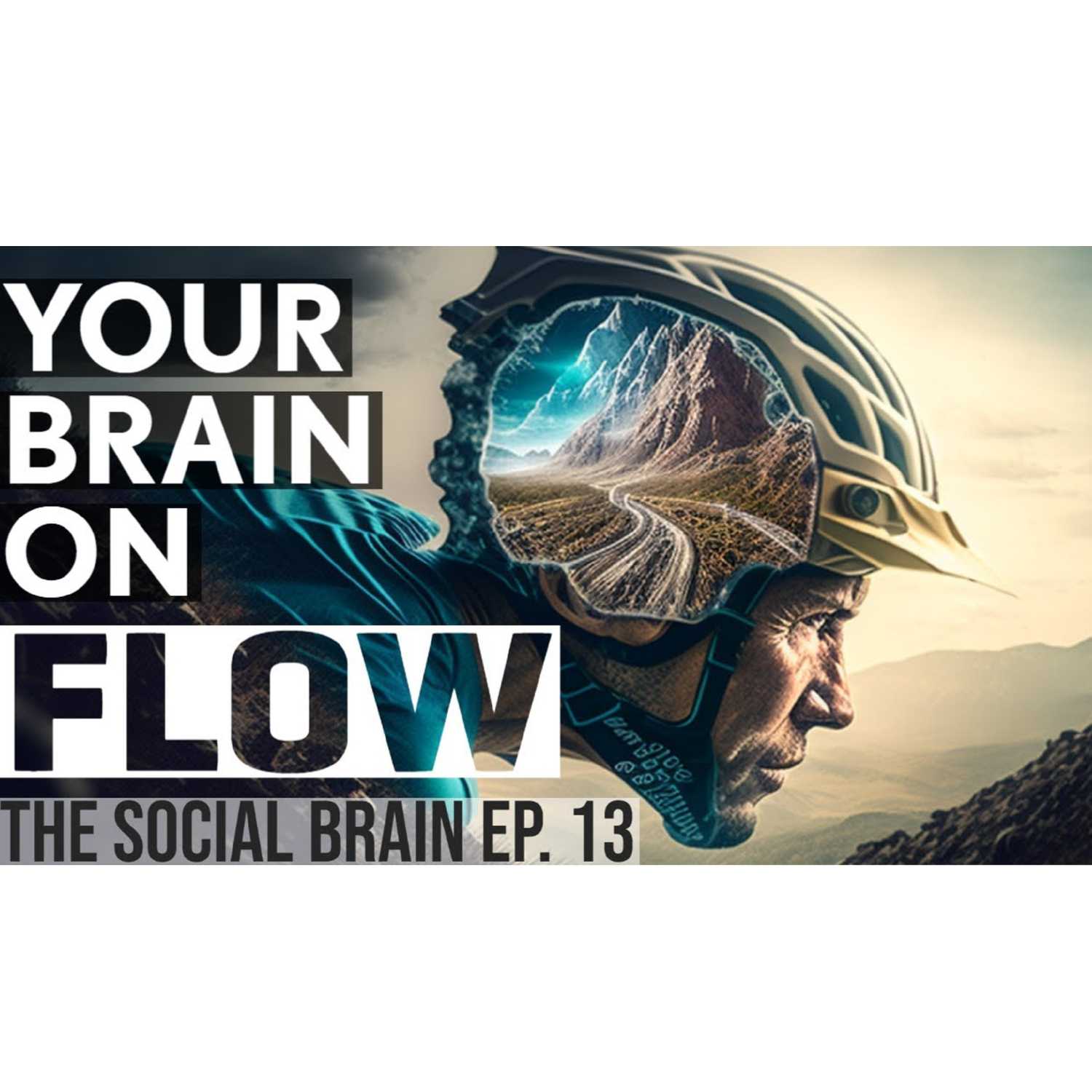
The Social BrainUnlocking the Power of Flow: The Neuroscience of Peak ExperienceWe’ve all experienced it at one point or another: that feeling of effortless, almost magical engagement with a task, where time seems to stand still and the world around us fades away. It’s the state of flow, and it’s been described as the ultimate form of happiness and productivity. Flow is a state that can be experienced in many different activities, from sports to art to work. It’s a feeling of being completely immersed in the task at hand, feeling a sense of ease and effortlessness in your actions. It’s a powerful state of being, and...
2023-03-211h 01
Sense of MindUnlocking the Power of Flow – The Neuroscience of Peak Experience (The Social Brain Ep. 13)We’ve all experienced it at one point or another: that feeling of effortless, almost magical engagement with a task, where time seems to stand still and the world around us fades away. It’s the state of flow, and it’s been described as the ultimate form of happiness and productivity. Flow is a state that can be experienced in many different activities, from sports to art to work. It’s a feeling of being completely immersed in the task at hand, feeling a sense of ease and effortlessness in your actions. It’s a powerful state of being, and...
2023-03-211h 01
Sense of MindHuman Uniqueness: How Our Brains Set Us Apart in the Animal KingdomWhat truly sets humans apart from other animals? In this episode, we'll explore the human brain and the unique characteristics that define our species. From our extraordinary language abilities and unmatched cognitive control to our intricate social networks and emotional experiences, we'll uncover the neurological basis for these traits and discuss their profound implications on human culture and civilization.
Join us on this intellectual adventure as we examine the anatomy of the human brain, comparing it to the brains of other primates and shedding light on the evolution of our exceptional mental capacities. We'll cover fascinating topics...
2023-03-1710 min
Sense of MindThe Biological Mind: Consciousness and the Brain (Patreon-Only Livestream #1)What is the relationship between the brain and the mind? Does the brain produce consciousness? What is the "hard problem" of consciousness and does neuroscience have anything to say about it? In this Patreon-only livestream, I discussed my answers to all of these questions and dove into some of the neuroscientific evidence that backs up my answers.
--
Sense of Mind needs your help! This podcast is now 100% independent (I'm no longer receiving outside funding), so please consider becoming a Patron by going to https://www.patreon.com/senseofmind
As a Patron, you'll get...
2023-03-0752 min
Sense of MindThe Evolution of the Cerebral Cortex: How Primates Changed the Brain GameExplore the fascinating evolution of the cerebral cortex, the most sophisticated brain region, which is crucial for complex cognition and perception. In this episode, you'll learn how the cortex evolved from a simple network of nerves in giant worms to the highly specialized and intricately wired cortex of haplorrhines, the primate group that includes humans. Discover the selection pressures that drove the lateral expansion of the cortex and the exponential growth of white matter connections. Plus, learn how the cerebellum, the brain structure involved in motor movement and balance, contributed to the expansion of the cortex. Don't miss this...
2023-03-0411 min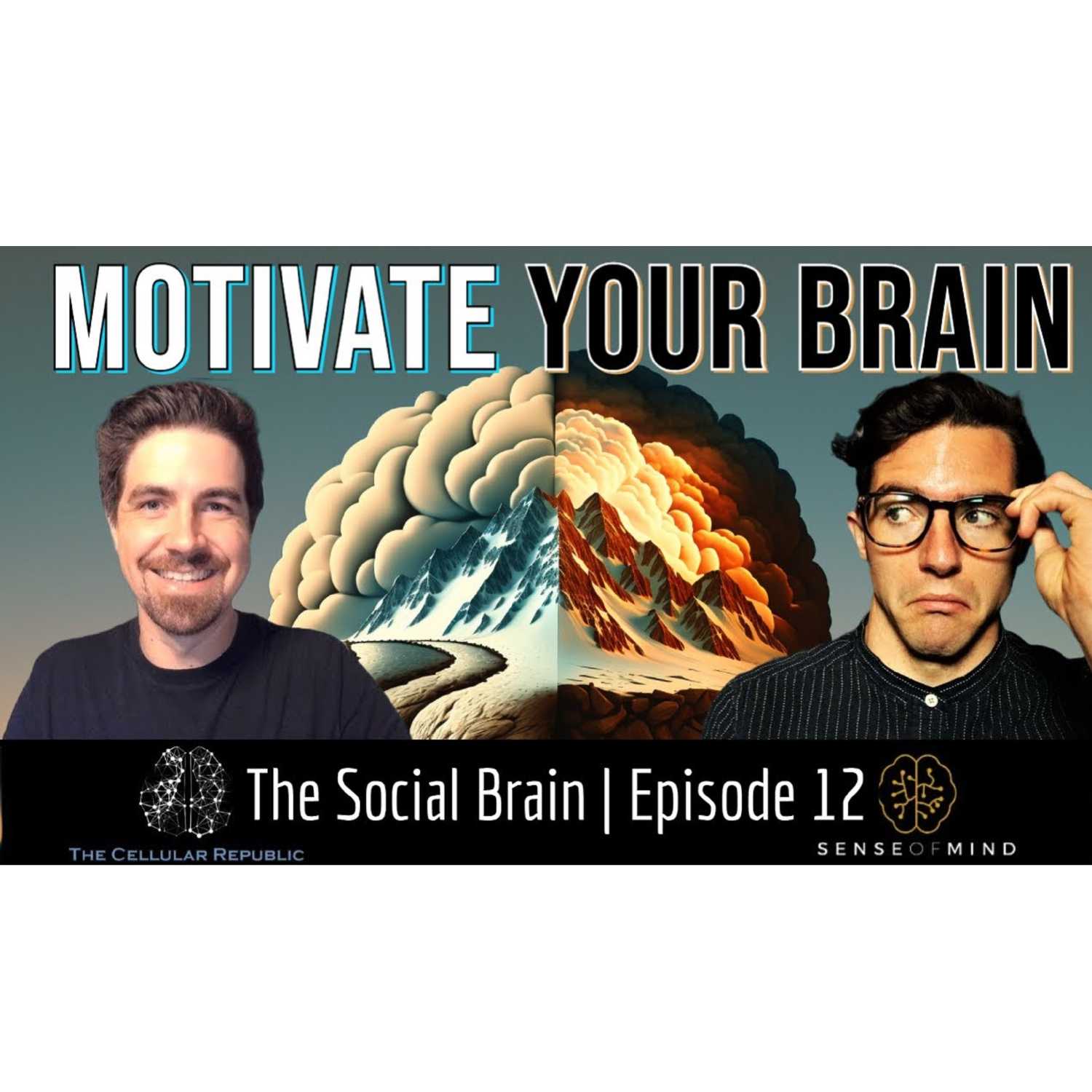
The Social BrainFrom Burnout to Bliss: Dopamine, Motivation, and GoalsDo you feel exhausted by work or life in general? More specifically, do you lack a feeling of motivation and drive that you used to have? If so, you might be experiencing burnout. Burnout is incredibly common, with a 2018 Gallup poll reporting that 23% of employees in the US say they feel burned out at work all or most of the time (and I would guess this is higher post-Covid). While motivation naturally ebbs and flows, when you have an ongoing lack of motivation combined with exhaustion, depression, and other negative emotions, it might mean that you are burned out...
2023-03-011h 01
Sense of MindFrom Burnout to Bliss: Dopamine, Motivation, and Goals (The Social Brain Episode 12)Do you feel exhausted by work or life in general? More specifically, do you lack a feeling of motivation and drive that you used to have? If so, you might be experiencing burnout. Burnout is incredibly common, with a 2018 Gallup poll reporting that 23% of employees in the US say they feel burned out at work all or most of the time (and I would guess this is higher post-Covid).
While motivation naturally ebbs and flows, when you have an ongoing lack of motivation combined with exhaustion, depression, and other negative emotions, it might mean that you are bu...
2023-02-281h 01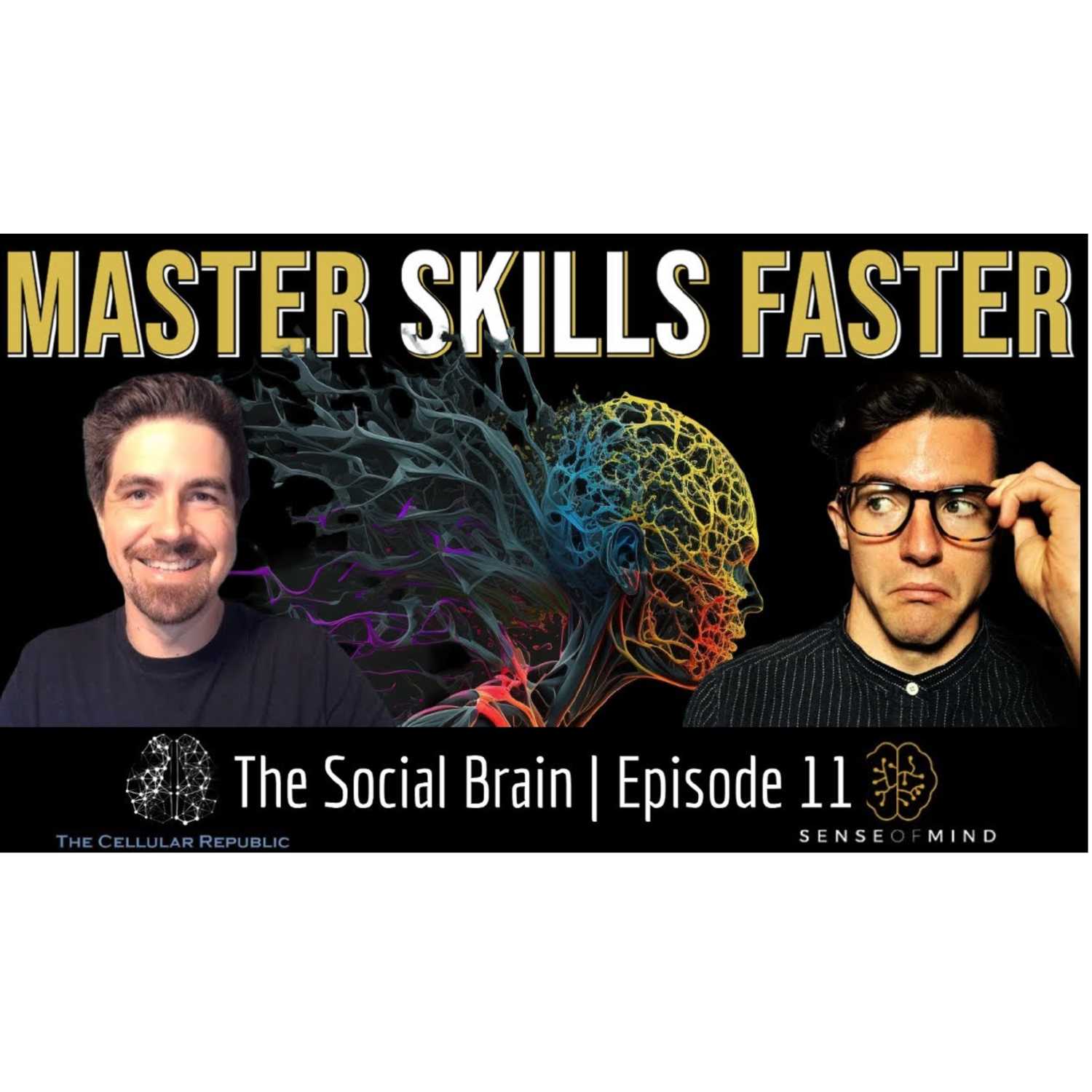
The Social BrainMaster Any Skill: Neuroscience of Motor LearningThese days, it's easy to take for granted the incredible complexity of motion, the way we are able to move through the world with such ease. We don't often think about the countless hours of practice, the countless micro-adjustments, and the countless neurons firing in our brain to make it all happen. Yet, motion is a form of intelligence, and understanding the neuroscience of motor learning can give us a tremendous power to master skills. We’ll be talking about the simple to implement principles from modern neuroscience that will revolutionize the way that you engage with the world an...
2023-02-141h 01
Sense of MindThe Social Brain Ep. 11: Master Any Skill – Neuroscience of Motor LearningThese days, it's easy to take for granted the incredible complexity of motion, the way we are able to move through the world with such ease. We don't often think about the countless hours of practice, the countless micro-adjustments, and the countless neurons firing in our brain to make it all happen. Yet, motion is a form of intelligence, and understanding the neuroscience of motor learning can give us a tremendous power to master skills. We’ll be talking about the simple to implement principles from modern neuroscience that will revolutionize the way that you engage with the world and...
2023-02-141h 01
Sense of MindThe Neuroscience of Sleep: How The Brain Controls SleepHow does the brain control sleep? Why do our brains need sleep in the first place? What are the health benefits of sleep? Why do some animals sleep more than others? What are dreams and why do our brains generate them? Why is it so hard to fall asleep when you’re stressed or hungry? How did sleep evolve?
In this video, we will explore the amazing science of sleep. We’ll see how specific brain regions, particularly the hypothalamus and brainstem, form circuits that make us fall asleep, stay asleep, and eventually wake up. We’ll look at...
2023-01-311h 00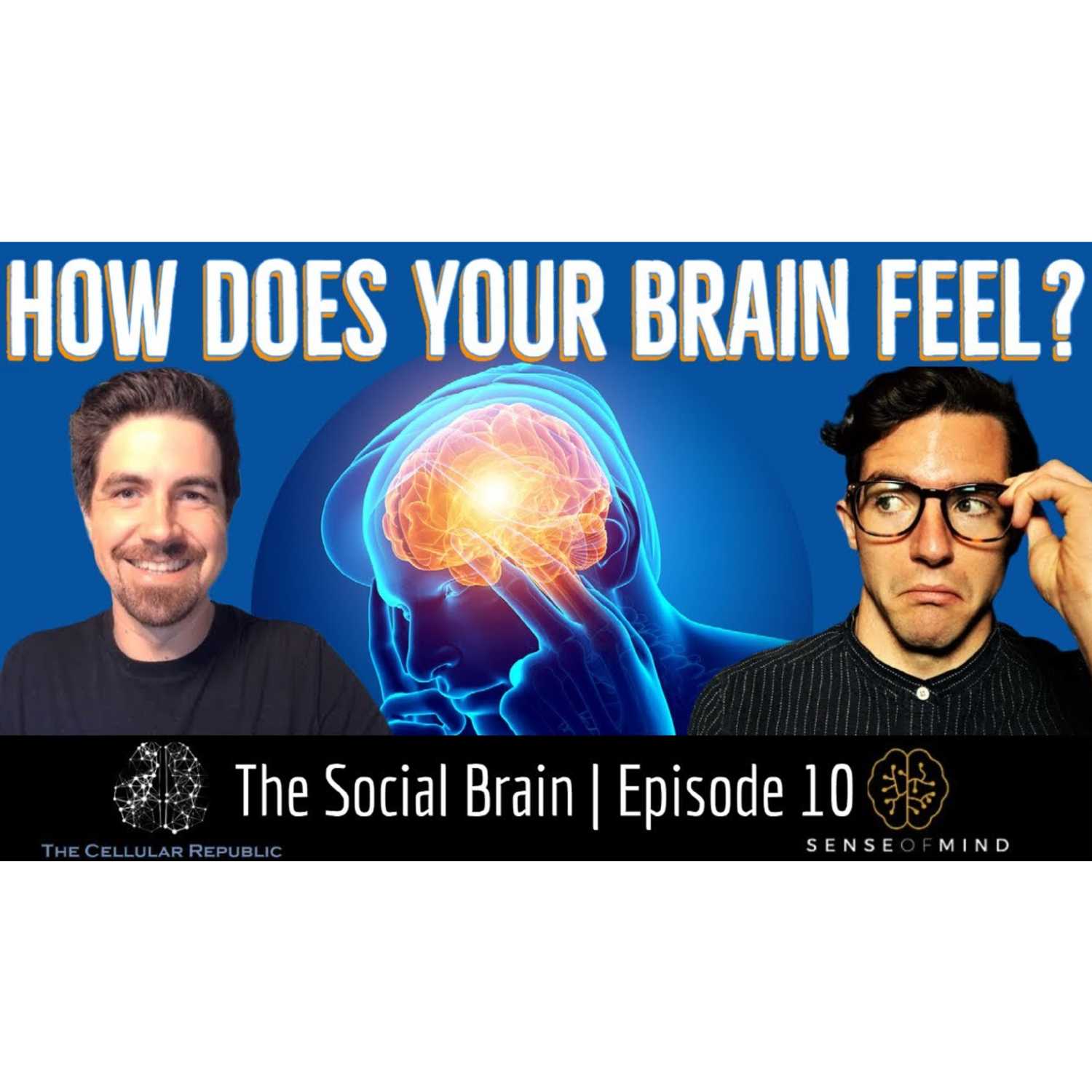
The Social BrainGet Out of Your Brain and Into Your Body: Interoception & PainTake a moment to feel what’s going on inside your body. Maybe your stomach is starting to feel hungry, or maybe it feels pleasantly full and satisfied. Maybe you don’t feel any specific area, but instead you sense a hum of life within you–your breath gently moving in and out and subtle tingles throughout your body. What’s amazing is that, while those feelings seem like they’re happening in your body, it’s not your body that’s actually feeling them! Instead, your brain is creating your experience of your body. Your brain can produce a feeling in y...
2023-01-251h 01
Sense of MindThe Social Brain Ep. 10: Get Out of Your Brain and Into Your Body: Interoception & PainTake a moment to feel what’s going on inside your body. Maybe your stomach is starting to feel hungry, or maybe it feels pleasantly full and satisfied. Maybe you don’t feel any specific area, but instead you sense a hum of life within you–your breath gently moving in and out and subtle tingles throughout your body. What’s amazing is that, while those feelings seem like they’re happening in your body, it’s not your body that’s actually feeling them! Instead, your brain is creating your experience of your body.
Your brain can produce a f...
2023-01-241h 01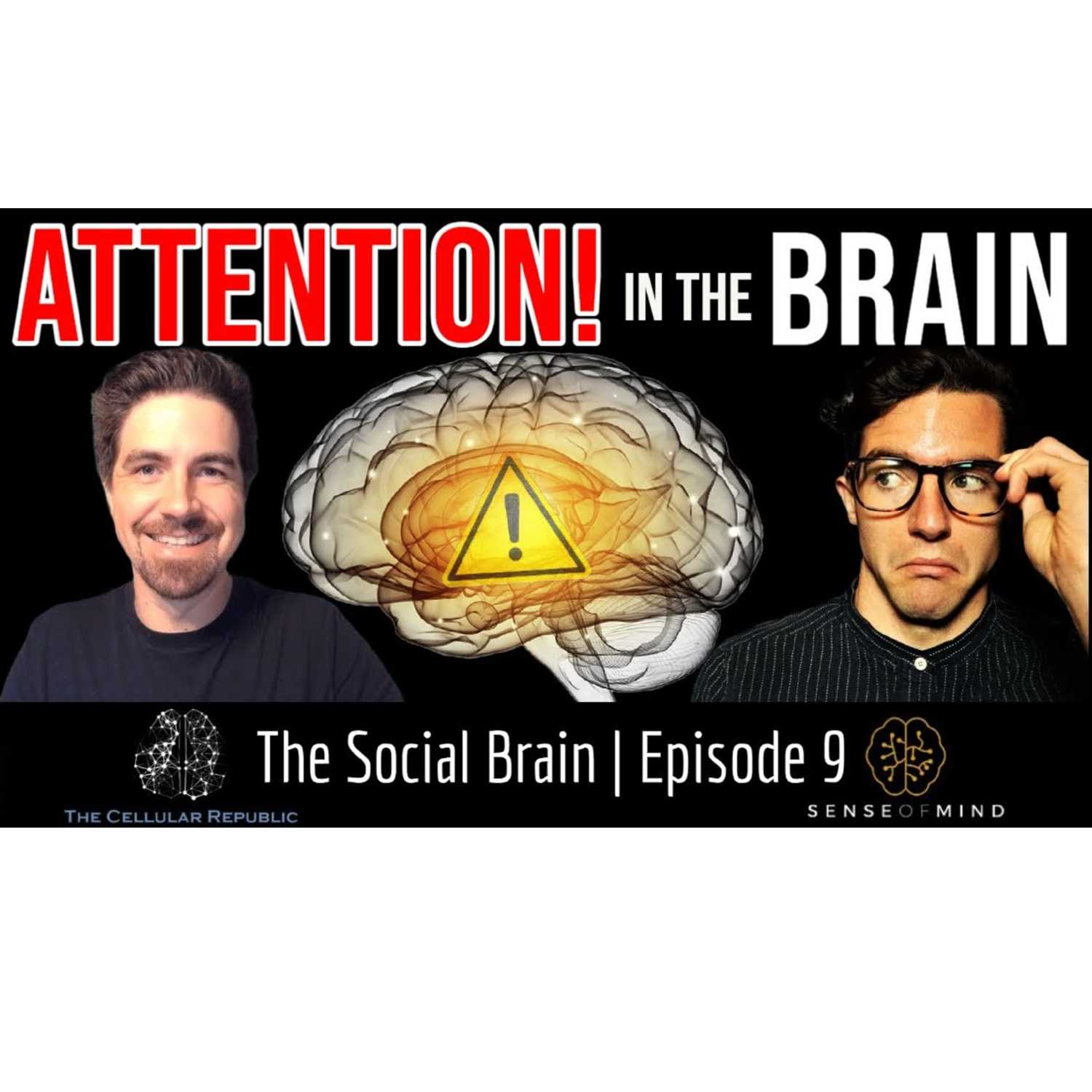
The Social BrainFOCUS! The Neuroscience of Attention and Strategies for Improving ItThese days, it's easy to feel overwhelmed and distracted by the barrage of notifications, emails, and tasks that vie for our attention. It can be hard to stay focused and give our undivided attention to the things that truly matter. Rather than reflexively reacting to the chaos, we must take the time to pause, reflect, and make intentional decisions about how to use the power of our attention. We often take for granted our ability to take control of our attention, forgetting that the brain's attention system is limited and requires us to be mindful and intentional in how...
2023-01-121h 01
Sense of MindThe Social Brain Ep. 9: FOCUS! The Neuroscience of Attention and Strategies for Improving ItThese days, it's easy to feel overwhelmed and distracted by the barrage of notifications, emails, and tasks that vie for our attention. It can be hard to stay focused and give our undivided attention to the things that truly matter. Rather than reflexively reacting to the chaos, we must take the time to pause, reflect, and make intentional decisions about how to use the power of our attention. We often take for granted our ability to take control of our attention, forgetting that the brain's attention system is limited and requires us to be mindful and intentional in how...
2023-01-101h 01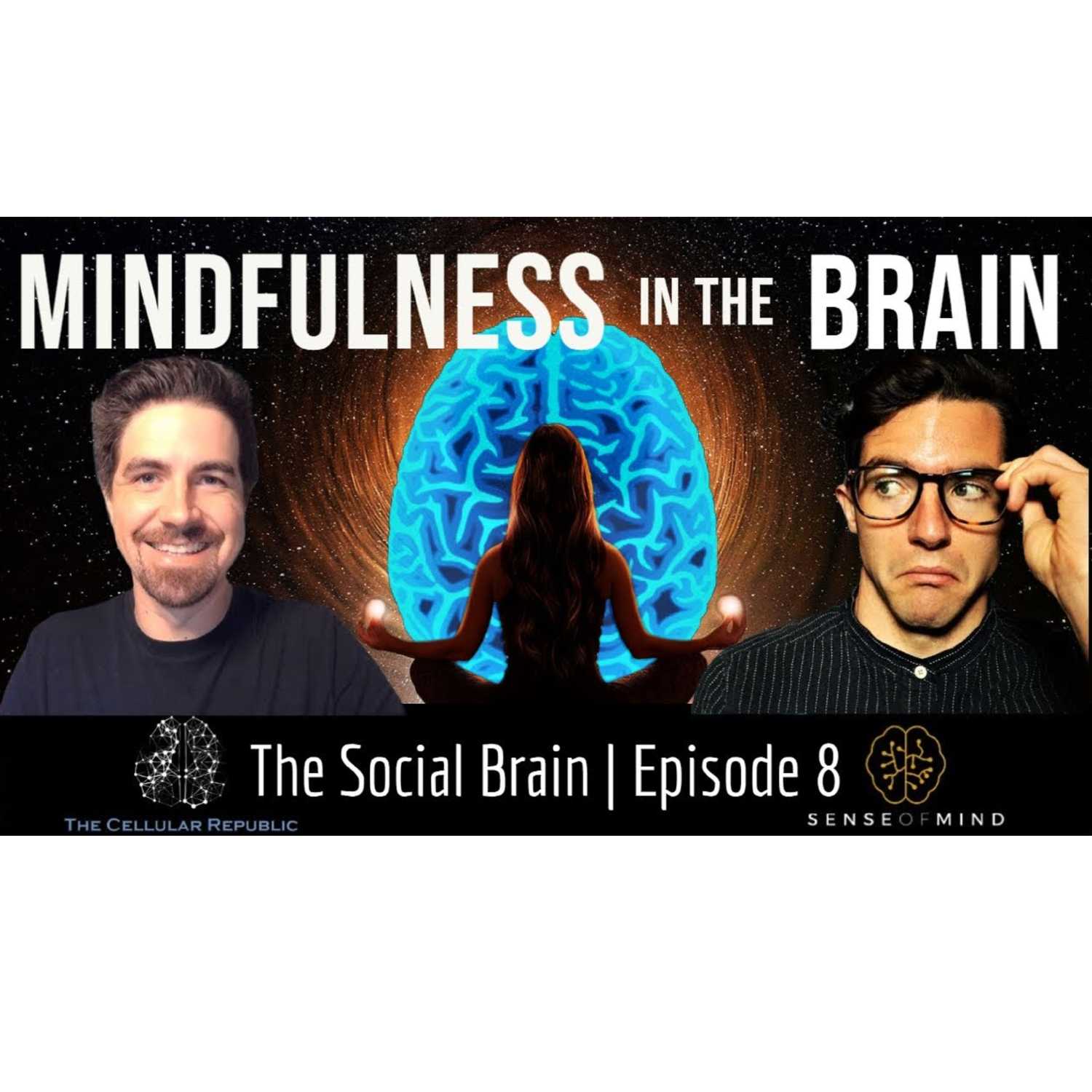
The Social BrainThe Neuroscience of Mindfulness: How Meditation Can Improve Your BrainWe spend a lot of time thinking about the future or the past, often at the expense of living in the present. As we talked about in the last episode, this kind of cognition is completely natural: it’s built into the brain’s default mode network. And while planning for the future, reviewing the past, and mind wandering are all important and healthy aspects of being human, they can also make us unhappy when they’re constantly taking us away from the present moment. Fortunately, there is a simple, research-backed method of countering the default mode, bringing us back t...
2022-12-201h 01
Sense of MindThe Social Brain Ep. 8: The Neuroscience of Mindfulness: How Meditation Can Improve Your BrainWe spend a lot of time thinking about the future or the past, often at the expense of living in the present. As we talked about in the last episode, this kind of cognition is completely natural: it’s built into the brain’s default mode network. And while planning for the future, reviewing the past, and mind wandering are all important and healthy aspects of being human, they can also make us unhappy when they’re constantly taking us away from the present moment.
Fortunately, there is a simple, research-backed method of countering the default mode, bringin...
2022-12-201h 01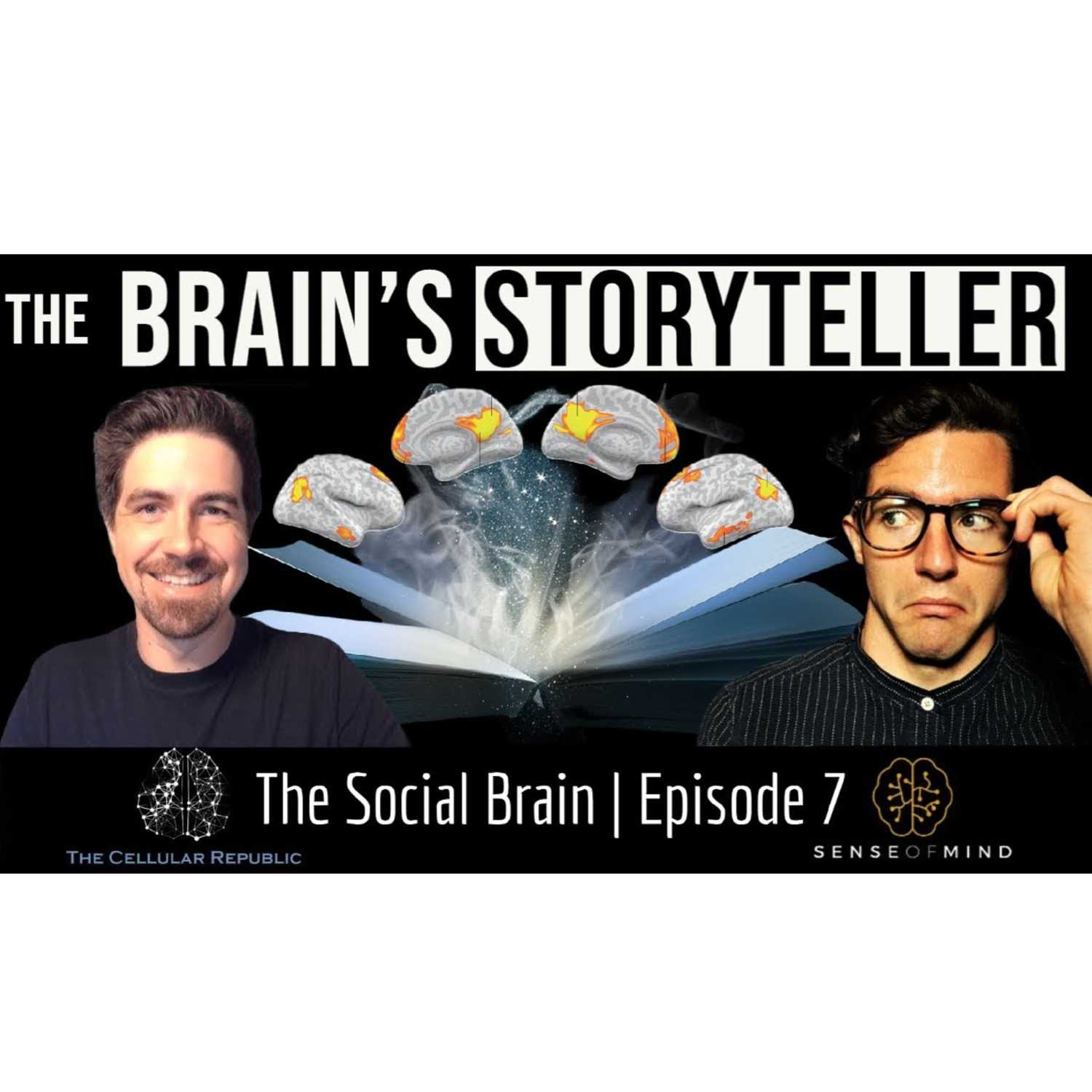
The Social BrainThe Default Mode Network: Integrating the past, present and futureWhat makes human cognition so much different from that of other animals? The short answer has to do with a single brain network: the default mode network (DMN). Humans are deliberative, able to flexibly combine the current moment with the past so that we can simulate and predict the future. We can remember things that occurred years and even decades ago and we can plan for life events that won't happen until well into our future. This allows us to build meaning and to develop identity and a sense of self. It allows us to build and navigate complex...
2022-12-071h 00
Sense of MindThe Social Brain Ep. 7: The Default Mode Network - Integrating the past, present and futureWhat makes human cognition so much different from that of other animals? The short answer has to do with a single brain network: the default mode network (DMN). Humans are deliberative, able to flexibly combine the current moment with the past so that we can simulate and predict the future. We can remember things that occurred years and even decades ago and we can plan for life events that won't happen until well into our future. This allows us to build meaning and to develop identity and a sense of self. It allows us to build and navigate complex...
2022-12-061h 00
Sense of MindThe Social Brain Ep.6: The Addicted BrainHow does the human brain develop an addiction? The extremely high prevalence rates for disorders such as alcohol use disorder or drug use disorder (1 in 3 AUD lifetime prevalence, 1 in 10 DUD lifetime prevalence) suggests that addiction is not simply a disease but is instead a natural brain process that each and every one of us is susceptible to. The fascinating thing that is unraveling in the research is that the brain processes that lead to addiction are not drug or alcohol specific but instead are involved in every form of addiction (gambling, sex, shopping, technology... etc)
-- What do...
2022-11-231h 02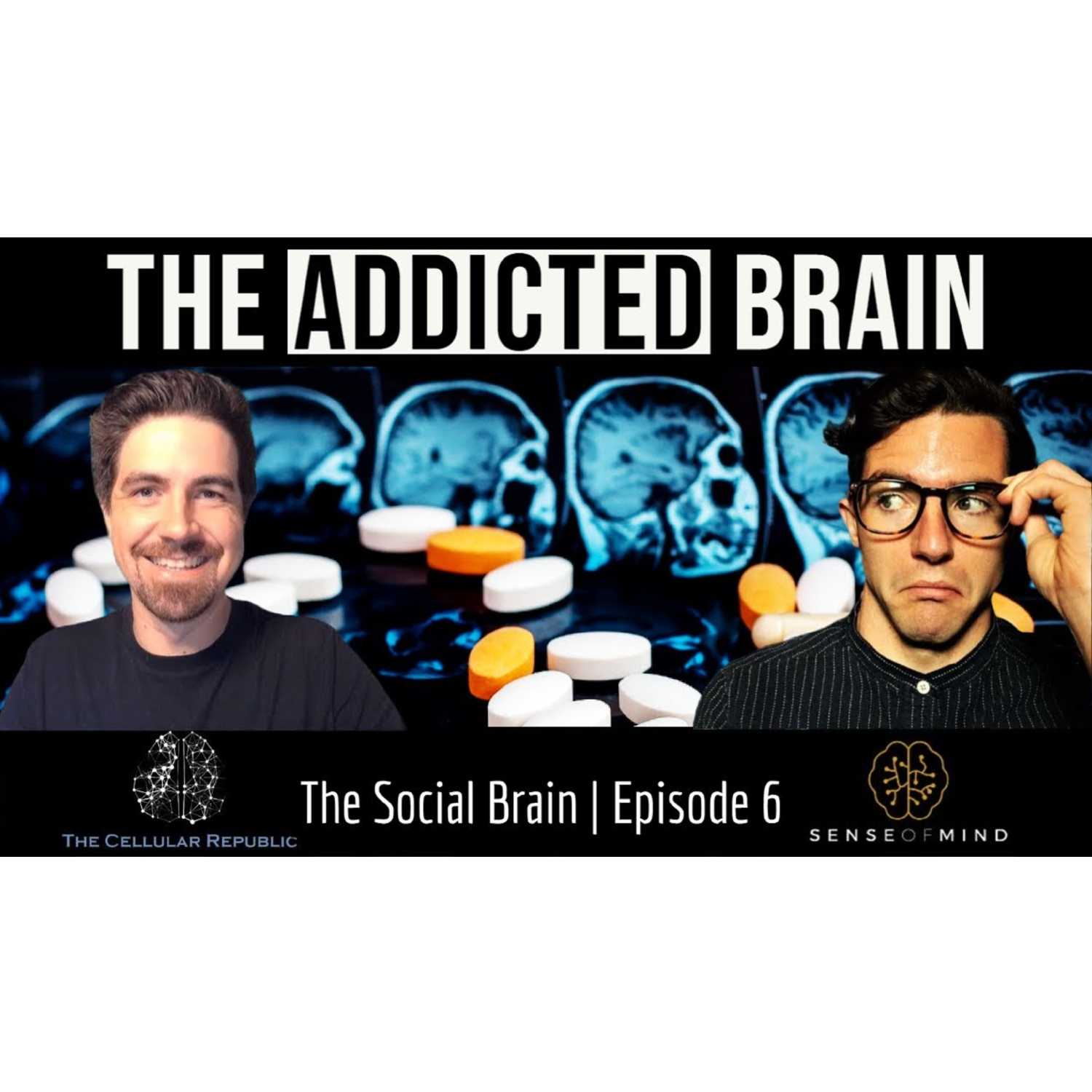
The Social BrainThe Addicted BrainHow does the human brain develop an addiction? The extremely high prevalence rates for disorders such as alcohol use disorder or drug use disorder (1 in 3 AUD lifetime prevalence, 1 in 10 DUD lifetime prevalence) suggests that addiction is not simply a disease but is instead a natural brain process that each and every one of us is susceptible to. The fascinating thing that is unraveling in the research is that the brain processes that lead to addiction are not drug or alcohol specific but instead are involved in every form of addiction (gambling, sex, shopping, technology... etc).
2022-11-231h 02
Sense of MindEpisode 43: Interoception: Why Emotions Feel the Way They DoSense of Mind Podcast Episode 43: Interoception: Why Emotions Feel the Way They Do
Watch here: https://youtu.be/5-8IfXRMM9g
Feelings are extremely important indicators of our wellbeing, whether they’re purely physical internal sensations (like a stomach ache) or emotional feelings (like the upset stomach you might get before you give a big presentation). Interoception is the sense of the inside of the body, and it provides the basis for both types of feelings. In this video, we’ll see how bodily sensations are turned into emotional feelings in the brain, and vice vers...
2022-11-1810 min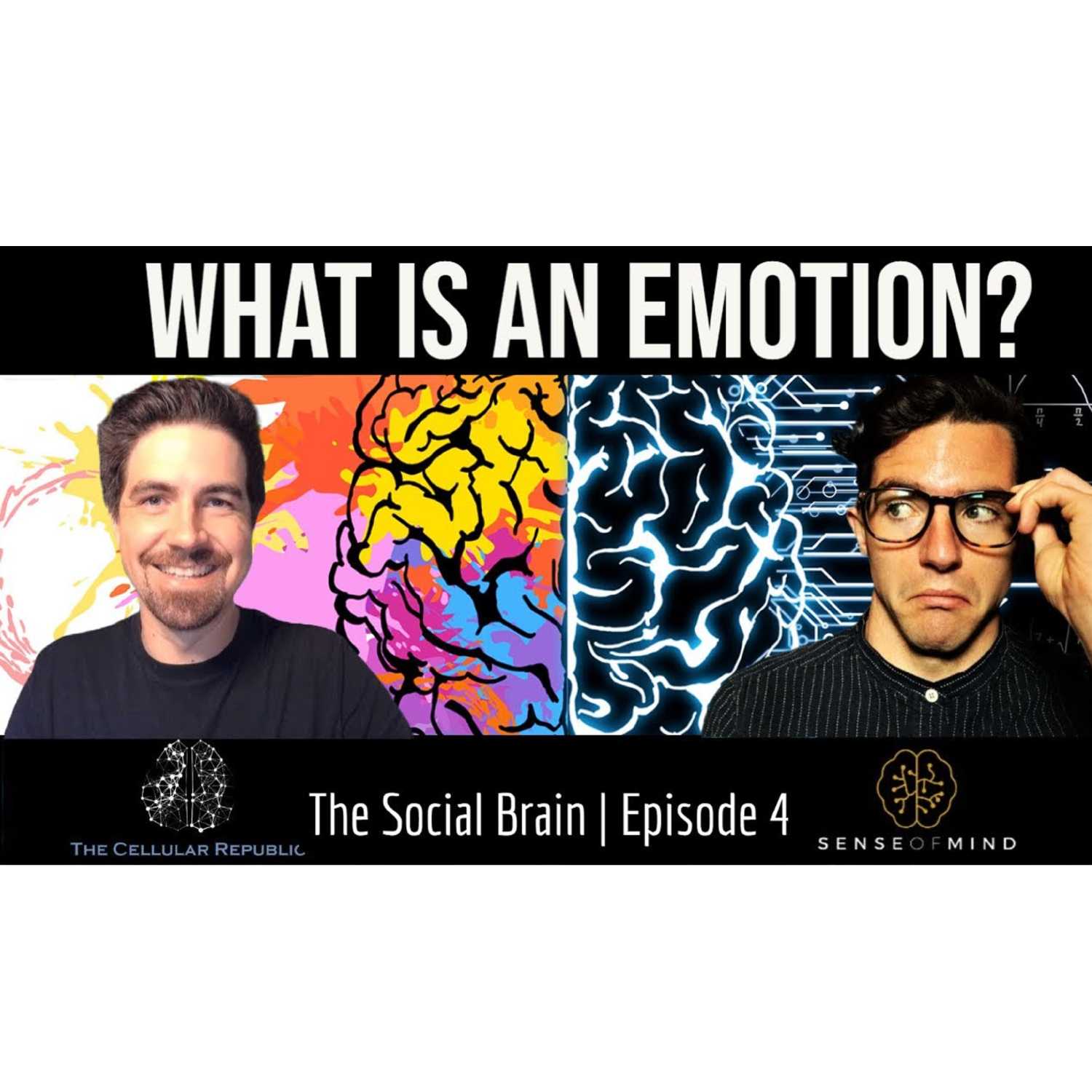
The Social BrainWhat is an Emotion?Everyone knows what an emotion is.. until they are asked to explain it. We all have a sense that we are living emotional lives and that these emotional drives have immense control of our behavior but it’s hard to say what that emotion actually is. Is it the physiology? Is it the brain activity? Can single cells have feelings or emotions without nervous systems? Are there such things as basic emotions (happiness, fear, anger, surprise.. etc) and are there dedicated brain systems for them?
2022-11-061h 03
Sense of MindThe Social Brain Ep.5: What is an emotion?Idea for audience to ponder: Everyone knows what an emotion is.. until they are asked to explain it. We all have a sense that we are living emotional lives and that these emotional drives have immense control of our behavior but it’s hard to say what that emotion actually is. Is it the physiology? Is it the brain activity? Can single cells have feelings or emotions without nervous systems? Are there such things as basic emotions (happiness, fear, anger, surprise.. etc) and are there dedicated brain systems for them? -- What do you want us to cover in futu...
2022-11-011h 03
Sense of MindEpisode 42: Horror Movies MANIPULATE YOUR BRAIN (the neuroscience of scary movies)Sense of Mind Podcast Episode 42: Horror Movies MANIPULATE YOUR BRAIN (the neuroscience of scary movies)
Horror movies can subtly manipulate the human brain, causing us to feel fear when there is not actually any danger. Scary movies do this by stimulating our brain’s fear circuit. But that’s pretty obvious. The more important question is: Why do people voluntarily submit themselves to such a scary experience? Why do some people enjoy horror movies while others can’t stand it? How do horror movies take advantage of our brain’s design to make us simultaneously feel terrified while kn...
2022-10-2809 min
Sense of MindThe Social Brain Ep.4: Brain Decoding: The Science of ‘Mind Reading’Can scientists read your mind and figure out what you're thinking just by looking at your brain? Well, sort of. In this episode of The Social Brain with Taylor Guthrie (@The Cellular Republic) and I (@Sense of Mind) talk about a fascinating new area of cognitive neuroscience, called "brain decoding" as well as its counterpart, "brain encoding," and related topics. It all centers on the question posed above and the future applications, some of which are scary while others are inspiring.
-- What do you want us to cover in future episodes? Drop it in the comments!
...
2022-10-181h 01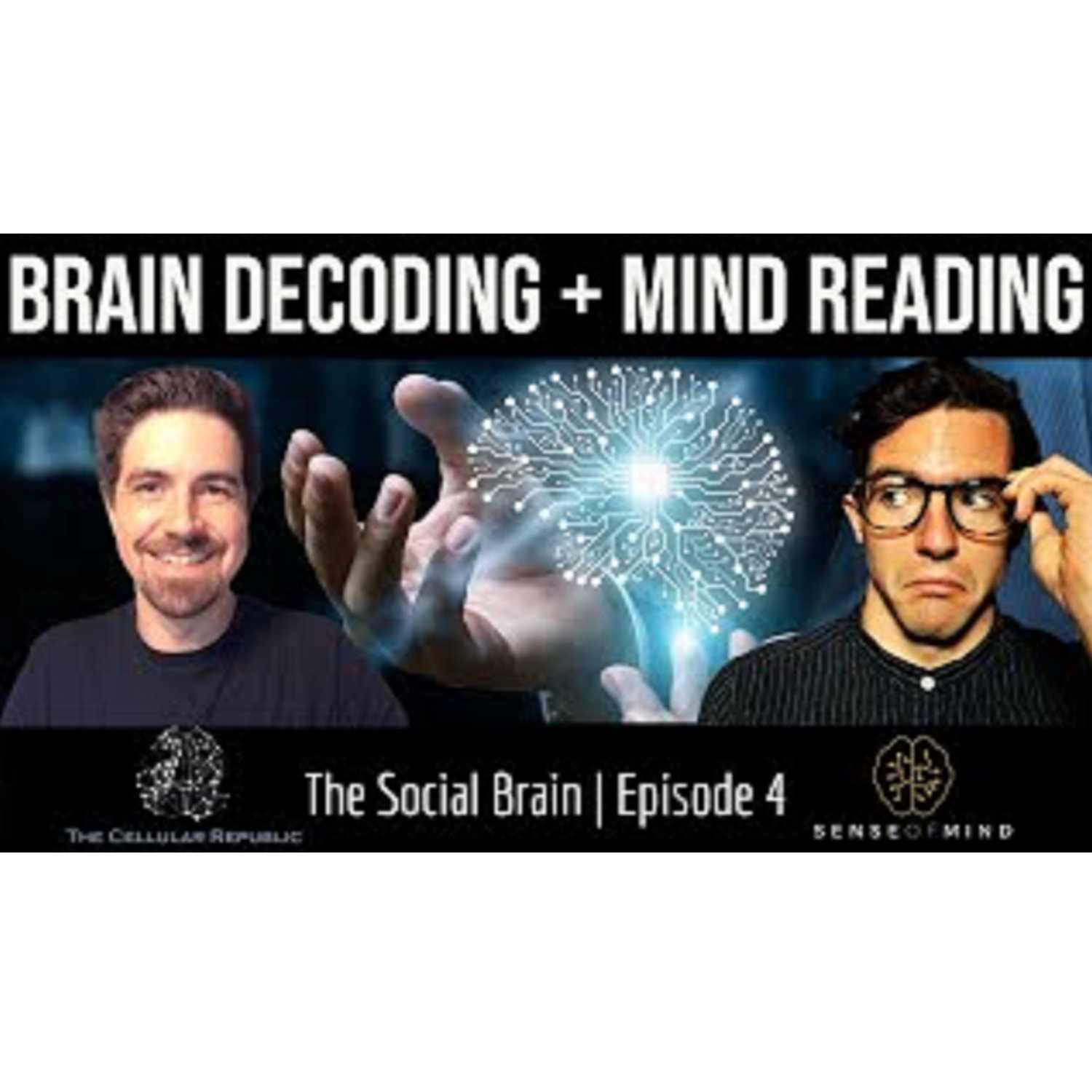
The Social BrainBrain Decoding: The Science of 'Mind Reading'Neuroscientists are on the cusp of cracking the neural code. Just by looking at the brain data, computer algorithms are reading out and recreating what people saw and listened to. Learn how we got there and what the future has in store.
2022-10-181h 01
Sense of MindEpisode 41: PLEASURE GENERATORS in the Brain: The Neuroscience of Pleasure ExplainedSense of Mind Podcast Episode 41: PLEASURE GENERATORS in the Brain: The Neuroscience of Pleasure Explained
In the brain, pleasure is generated by a handful of brain regions called, “hedonic hotspots.” If you were to stimulate these regions directly, you would likely feel pleasurable sensations. However, not all of the hedonic hotspots are the same–some generate the raw sensations of pleasure whereas others are responsible for consciously interpreting and elaborating on the raw pleasure produced by the other hotspots. In this video, in addition to exploring the neuroscience of pleasure, we’ll see how understanding pleasure, happiness, meaning...
2022-10-1413 min
Sense of MindThe Social Brain Ep.3: Getting on the Same WavelengthBrain synchronization and shared neural representations! In episode 3 of The Social Brain with The Cellular Republic (Taylor Guthrie) and me, we talk about how brain activity in two different people's brains can become synchronized in social situations. We also talk about Taylor's research into the fact that people who are friends tend to show similar patterns of brain activity in various scenarios.
--
What do you want us to cover in future episodes? Drop it in the comments!
Link to follow: Make sure to subscribe to Taylor's Channel: @The Cellular Republic Subscribe to @Sense of Mi...
2022-10-1058 min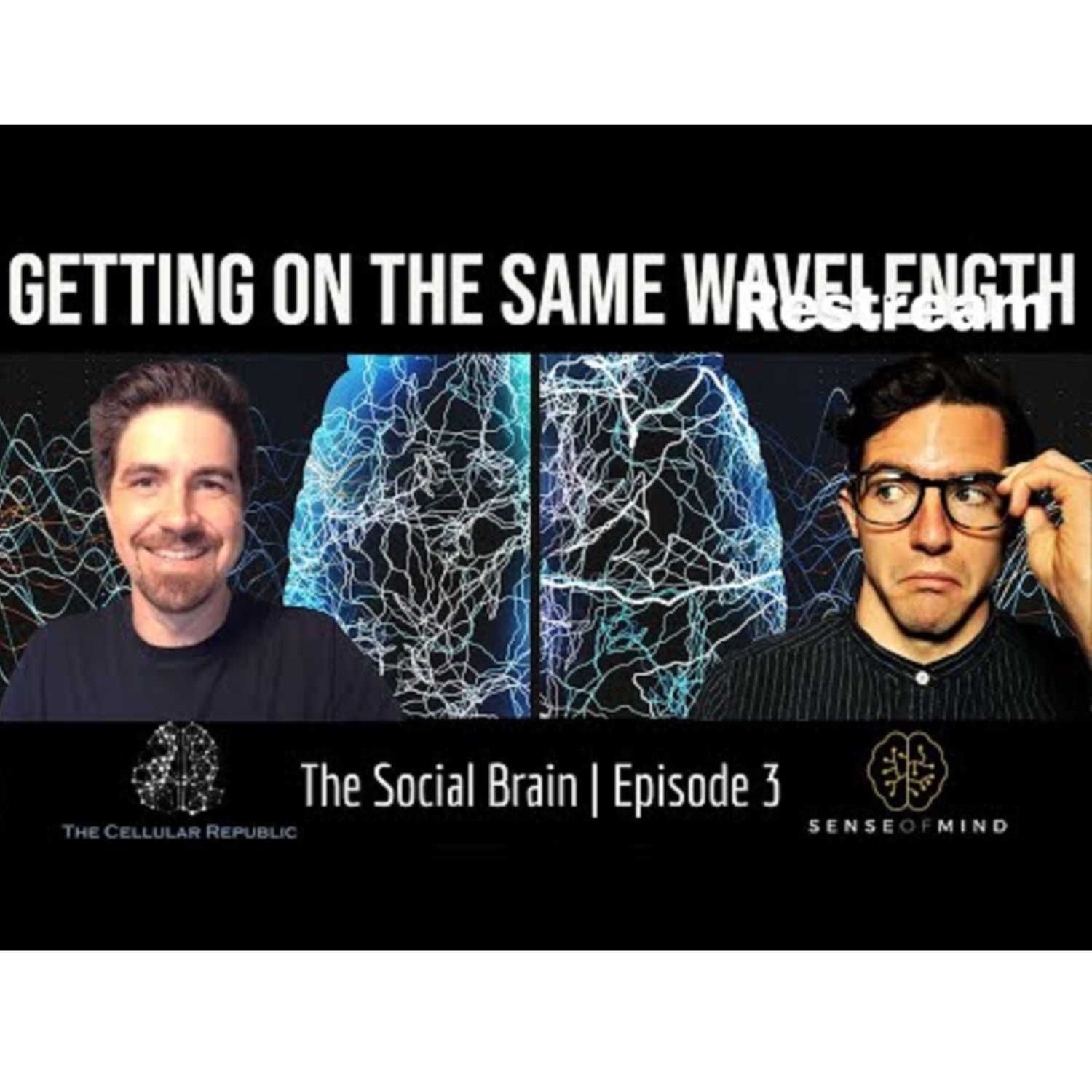
The Social BrainGetting on the Same Wavelength: How our Brains Sync UpWe all know the feeling of being in sync with one another or feeling like we're understood by those around us. Is there something actually going on in our brains during these moments? Do our brains get in sync with one another and get "on the same wavelength"? Does the strength of our social relationships affect this whole process? We'll dig into all of this and so much more in this episode of The Social Brain! Sorry in advance for the sound quality.. there were technical issues during the live cast.
2022-10-0558 min
Sense of MindThe Social Brain Ep.2: The Rise of Social NeuroscienceNeuroscience has a fascinating and at times funny history but it is an extremely new scientific discipline. Explore with us how neuroscience got it's start and how this led to the rise of fields like social and cognitive neuroscience. This is the second episode of a new twice monthly podcast I'm doing with social neuroscientist Taylor Guthrie. Taylor is a researcher, PhD student, and lecturer at the University of Oregon, and he runs the neuroscience YouTube channel, "The Cellular Republic."
--
Check out The Social Brain: https://podcasts.apple.com/us/podcast/the-social-brain/id1645182617
2022-09-241h 00
Sense of MindThe Social Brain Ep.1: Life is a Social ProcessFrom single cells within an organism to individuals within a society, all living things engage in social processes. Join us and explore how these dynamic social interactions shaped evolution and made our brains what they are today. This is the first episode of a new twice monthly podcast I'm doing with social neuroscientist Taylor Guthrie. Taylor is a researcher, PhD student, and lecturer at the University of Oregon, and he runs the neuroscience YouTube channel, "The Cellular Republic."
Check out The Social Brain: https://podcasts.apple.com/us/podcast/the-social-brain/id1645182617
Check o...
2022-09-2458 min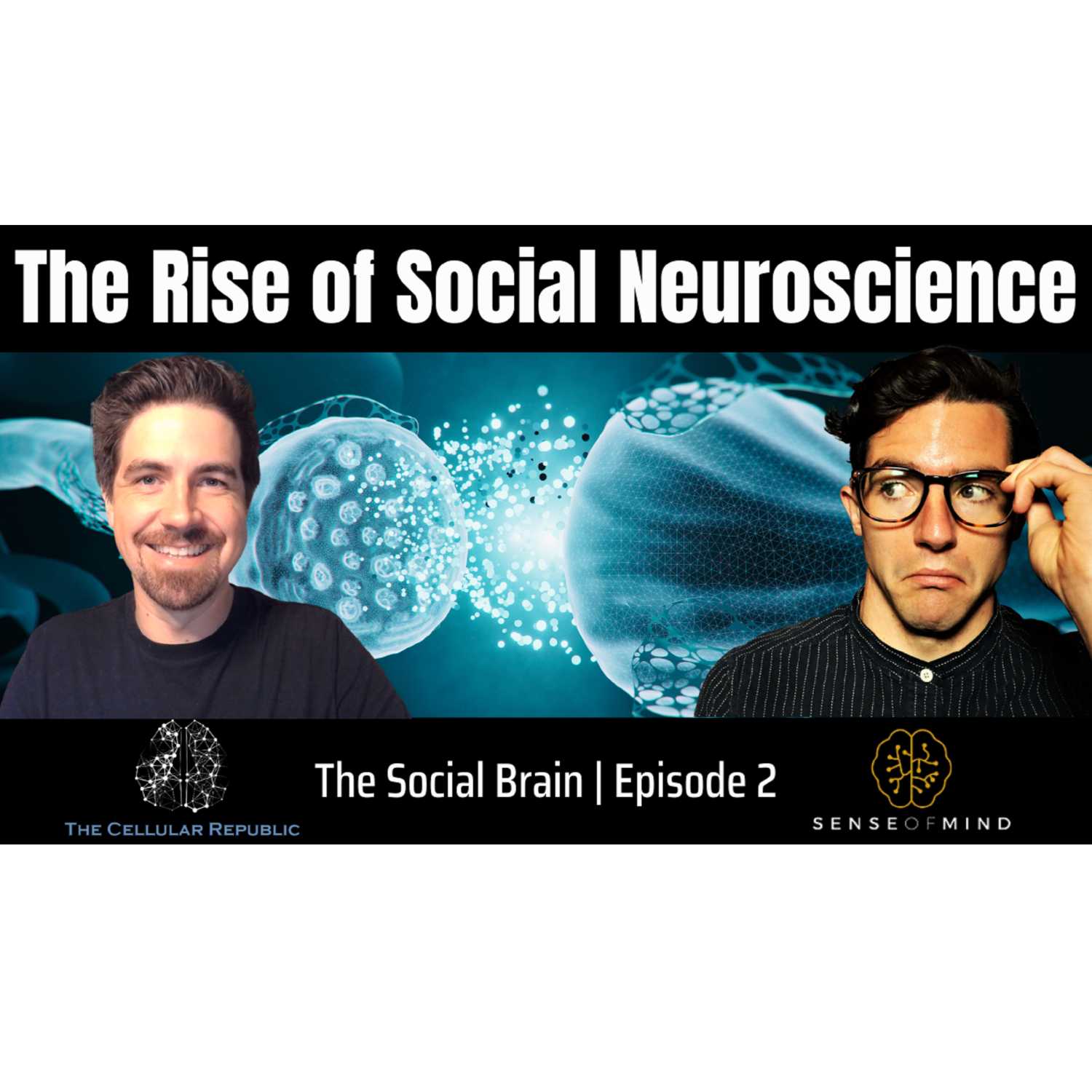
The Social BrainThe Rise of Social NeuroscienceNeuroscience has a fascinating and at times funny history but it is an extremely new scientific discipline. Explore with us how neuroscience got it's start and how this led to the rise of fields like social and cognitive neuroscience.
2022-09-221h 00
Sense of MindEpisode 40: How Emotions Influence Economic DecisionsSense of Mind Podcast Episode 40: How Emotions Influence Economic Decisions
How do your emotions influence your economic decisions? This video explores how sadness, disgust, fear, gratitude, and happiness influence our decisions, especially those around money. It also explains a couple strategies for regulating our emotions so we can make wiser financial decisions.
In general, happiness and gratitude make us more patient in delaying gratification. Fear makes all but the least risky (and therefore, least rewarding) outcomes appear threatening. Sadness makes us want to change our situation, leading us to buy or sell at disadvantageous prices...
2022-09-1613 min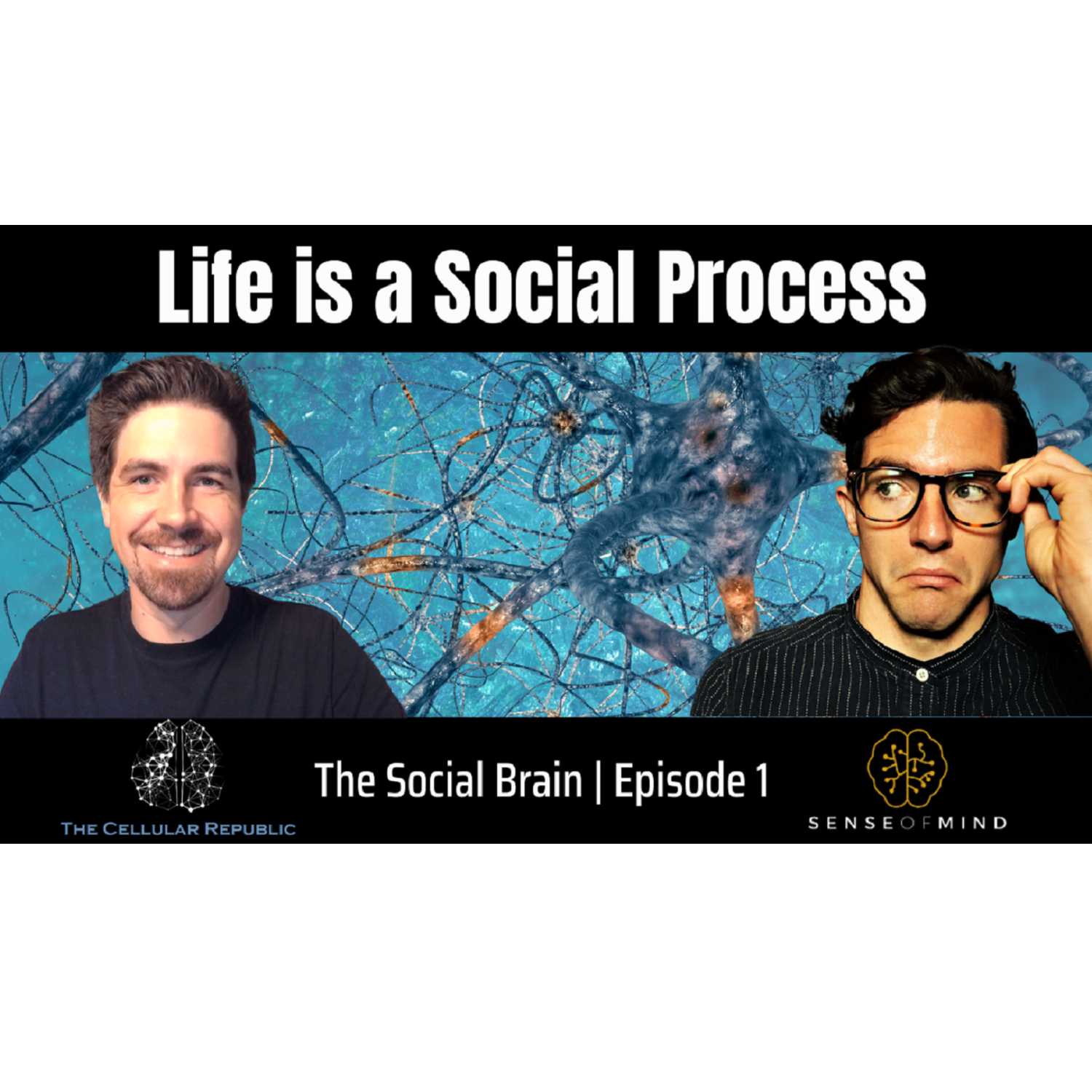
The Social BrainLife is a Social ProcessFrom single cells within an organism to individuals within a society, all living things engage in social processes. Join us and explore how these dynamic social interactions shaped evolution and made our brains what they are today.
2022-09-1258 min
Sense of MindEpisode 39: Oxytocin and Sociality - Understanding the ‘Love Hormone’Sense of Mind Podcast Episode 39: Oxytocin and Sociality - Understanding the ‘Love Hormone’
Watch the full video: https://youtu.be/kBbdWVy957E
Oxytocin and human sociality are deeply intertwined. In this video, we’ll look at methods to increase oxytocin levels, how oxytocin promotes helpful behaviors toward people we like and hostile behaviors toward those we don’t, the social salience hypothesis of oxytocin, the oxytocin system’s neuroanatomy and the brain regions affected by oxytocin.
Find all references on YouTube: https://youtu.be/kBbdWVy957E
--
Chapters
00:00 Ox...
2022-09-0215 min
Sense of MindEpisode 38: Dog Minds Decoded with Ellen FurlongSense of Mind Podcast Episode 38: Dog Minds Decoded with Ellen Furlong
Watch the full video: https://youtu.be/J-9rao7zdxY
Dogs have rich and complex minds. But since dogs can’t talk, we need scientists who can decode dog minds. So in this episode I interview Dr. Ellen Furlong, a scientist who studies dog psychology and the author of the course, “Decoding Dogs: Inside the Canine Mind,” which is available from Audible and the Great Courses.
Ellen Furlong is an Associate Professor in Psychology at her alma mater, Transylvania University, where she studie...
2022-08-261h 27
Sense of MindEpisode 37: Talking About Neurotheology with Bryan SpoonSense of Mind Podcast Episode 37: Talking About Neurotheology with Bryan Spoon
Watch the full video: https://youtu.be/jsZp_9ILcbI
In this episode I’m talking about neurotheology with Bryan Spoon, who is a pastor, chaplain, and neuroscience YouTuber who runs the channel @Neurotheology. “Neurotheology” is the branch of neuroscience that seeks to understand the relationship between the human brain and religion. I loved having this conversation with Bryan. Even though we differ on our religious views (I’m an atheist and he’s a Christian pastor), we had a fruitful and amicable discussion about neuroscien...
2022-08-191h 18
Sense of MindEpisode 36: How the Cerebellum Works - Dissecting the “Little Brain"Sense of Mind Podcast Episode 36: How the Cerebellum Works - Dissecting the “Little Brain"
Watch the full video: https://youtu.be/Y0qNM93Ztt0
The cerebellum is important for movement and cognition. That might be a surprise, because for a while the cerebellum was thought to be solely involved in the coordination of bodily movements. While the cerebellum is undoubtedly crucial for coordination and accuracy of movement, it is important for emotional regulation and executive functions, as well as verbal, linguistic, and visuospatial abilities.
--
Connect, Follow, Subscribe and Support Sense of...
2022-08-1238 min
Sense of MindEpisode 35: Cognitive Science with Ryan RhodesSense of Mind Podcast Episode 35: Cognitive Science with Ryan Rhodes
Watch the full video: https://youtu.be/P0ejbrcnmPY
Cognitive science is a fascinating area of study that aims to understand how the mind works as an information processing machine. For anyone interested in neuroscience or psychology, it’s important to understand the basics of cognitive science. So in this week’s episode, I’m talking to cognitive scientist and YouTuber, Dr. Ryan Rhodes.
Ryan is Assistant Teaching Professor for the Rutgers University Center for Cognitive Science, where he teaches interdisciplinary courses on langua...
2022-08-051h 07
Sense of MindEpisode 34: Nicholas Christakis on The Evolutionary Origins of SocietySense of Mind Podcast Episode 34: Nicholas Christakis on The Evolutionary Origins of Society
Watch the full video: https://youtu.be/ZymrWBQ9nfE
Human societies are a product of our evolution as a social species. While many scientists have focused on the negative side of our evolved social life–especially our violent tendencies–that’s only half the story. Physician and social scientist, Dr. Nicholas Christakis argues that we also have an evolved tendency toward forming good societies where people flourish. In this interview, Dr. Christakis and I discuss this and related ideas from his 2019 book, “Blueprin...
2022-07-291h 09
Sense of MindEpisode 33: Psychology Unlocked! A Conversation with Daniel EdwardSense of Mind Podcast Episode 33: Psychology Unlocked! A Conversation with Daniel Edward
Watch the full video:https://youtu.be/5-TWn5_E1YQ
What is psychology? How do scientists study the mind? What are the most important experiments in the history of psychology? These are questions that Daniel Edward has been asking and answering on his popular YouTube channel, @Psychology Unlocked. I first came across this channel a few months ago, and I was instantly hooked by Daniel’s clear presentation and his passion for understanding the mind and the field of psychology. In this interview, we...
2022-07-221h 13
Sense of MindEpisode 32: Talking About Neuroscience with Athanasios Bourganos (@Cognic)Sense of Mind Podcast Episode 32: Talking About Neuroscience with Athanasios Bourganos (@Cognic)
Watch the full video: https://youtu.be/SAnsT0cVu30
What is the history of neuroscience? What role does philosophy play in our understanding of how the brain works? In this interview, Athanasios Bourganos (also known as @Cognic on YouTube) and I discuss these fascinating questions. We also touch on free will, how to think about neuroscientific findings, science communication, and generally how the brain works.
Athanasios Bourganos is a neuroscientist and content creator through his YouTube channel, Cognic (https://www.youtube.c...
2022-07-121h 07
Sense of MindEpisode 31: Shame - with Joseph BurgoSense of Mind Podcast Episode 31 - Shame - with Joseph Burgo
Watch full video: https://youtu.be/8wpnL0gjKNE
Shame is an unpleasant emotion we have all experienced at one point or another. Most of us know it as the feeling associated with knowing that we’ve done something wrong–that our actions were not aligned with our values. In this way, as my interview guest Dr. Joseph Burgo argues, shame can be a positive emotion, because truly understanding why you feel ashamed can help you to grow to be the person you want to be. M...
2022-07-0856 min
Sense of MindEpisode 30: How To Be Fearless: The Neuroscience of Fear ConditioningSense of Mind Podcast Episode 30 - How To Be Fearless: The Neuroscience of Fear Conditioning
Watch the full video here: https://youtu.be/UQba4QXHdO8 (references on YouTube!)
--
Chapters
00:00 The neuroscience of fear conditioning helps explain how our brains learn to fear things
00:36 Fear Conditioning and Extinction
01:29 Unconditioned vs Conditioned Stimulus
01:50 The Freeze Response
02:32 Fear Extinction
03:27 Fear Conditioning Mechanisms in The Brain
08:50 Disrupting Fear Memories
11:25 Strengthening Extinction Memories in Human Clinical Fear Conditioning Paradigms
13:11...
2022-07-0115 min
Sense of MindEpisode 29: Your brain’s alarm system: The AmygdalaSense of Mind Podcast Episode 29 - Your brain’s alarm system: The Amygdala
Watch the full video here: https://youtu.be/fXuZpMiSGHk
The amygdala detects important features of the environment and it can trigger the fight or flight response. This brain region used to be thought of as the brain’s ‘fear center’ or sometimes as the emotional core of the brain, but in recent years neuroscientists have discovered that the amygdala’s function is more general. It now appears that the amygdala’s function is to detect important and relevant features of our sensory experience...
2022-06-2416 min
Sense of MindEpisode 28: NeuroplasticityThinking Tools Podcast Episode 28 - Neuroplasticity
Watch the video here: https://youtu.be/q-iQGoxmRkM
“Neuroplasticity” refers to the fact that your brain can change its structure and function over time. Neuroplasticity is also sometimes called “brain plasticity,” or simply, “plasticity.” What this means is that you can change how your brain works, at least within certain constraints, such as genetic proclivities and the fundamentals of neurophysiology. You can learn valuable skills and facts. You can even train your brain to be happier, less anxious, and more resilient in the face of adversity.
All of this happ...
2022-06-1011 min
Sense of MindEpisode 27: Learning and The Brain | Interview with Artem KirsanovSense of Mind Episode 27: Learning and The Brain | Interview with Artem Kirsanov -
Watch the full video here: https://youtu.be/nFtouEhBj7I
--
How does your brain learn about and navigate the world? What brain areas are responsible for our ability to form mental maps of places and spaces? How are attention and memory implemented in the brain and how do they contribute to learning?
In this episode of the Thinking Tools Podcast, I speak with Artem Kirsanov, a YouTuber and neuroscience undergraduate who has produced a number of visually s...
2022-06-031h 01
Sense of MindEpisode 26: Prefrontal CortexThinking Tools Podcast Episode 26 - Prefrontal Cortex
Watch the video here: https://youtu.be/p04xZjZUl2o
The prefrontal cortex (PFC) allows us to engage in what scientists call “cognitive control” (also known as “executive functioning”) and it is crucial for our sense of self. This video explains what the PFC is, why this brain region’s properties make it well suited to cognitive control and the sense of self, and how each of the subdivisions of the prefrontal cortex contributes to these functions. Includes interview clips with neuroscientists David Badre (Brown University), Gregory Hickok (UC Irvine...
2022-05-2034 min
Sense of MindEpisode 25: Scaling Biology - Interview with Geoffrey WestThinking Tools Podcast Episode 25 -
The idea of scaling, in biology, refers to how a biological system responds to changes in its overall size. More specifically, the properties that characterize animals–such as their metabolic rate, heart rate, and average lifespan–are systematically related to the size of the animal. But how, in a precise quantitative sense, does such biological scaling manifest?
In this episode of the Thinking Tools Podcast, I speak with Dr. Geoffrey West about these and other ideas from his 2017 book, “Scale: The Universal Laws of Growth, Innovation, Sustainability, and the Pace of Life...
2022-05-131h 22
Sense of MindEpisode 24: Social Neuroscience and The Self (Interview with Taylor Guthrie)Thinking Tools Podcast Episode 24 -
Understanding social neuroscience requires understanding the neuroscience of the self. That’s because our social interactions are deeply intertwined with how we understand ourselves, our goals, needs, desires, and dreads. Social cognitive neuroscience, one field that studies the brain in social circumstances, has discovered much regarding how our brains process information about ourselves and others.
In this episode of the Thinking Tools Podcast, I speak with Taylor Guthrie, the creator of one of my favorite YouTube channels, @The Cellular Republic (https://www.youtube.com/channel/UCUNqseoOq5DfzwCRI-7ZAow).
The...
2022-05-061h 04
Sense of MindEpisode 23: Spikes and Dark Neurons - An Interview with Mark HumphriesThinking Tools Podcast Episode 23 -
Spikes are action potentials–or the firing of neurons, while dark neurons indicate how rare such events really are in the human brain. That is, when we picture a brain, we sometimes imagine it flooded with action potentials, a hundred billion neurons all activating nearly simultaneously. The reality is that there are far fewer neurons active at any given time. Dr. Mark Humphries, author of the 2021 book, “The Spike: An Epic Journey Through the Brain in 2.1 Seconds,” has dubbed this phenomenon “the dark neuron problem.”
In this episode of the Thinking To...
2022-04-281h 01
Sense of MindEpisode 22: The Evolution of the BrainThinking Tools Podcast Episode 22 - The Evolution of the Brain
Watch the video here: https://youtu.be/j_ldDirCCns
The evolution of the brain began in relatively simple creatures, possibly for the purpose of coordinating digestion and other basic physiological processes. Hundreds of millions of years later, the brain evolved into the modern versions we see across the animal kingdom today. Yet, some may have changed more than others over that time. For example, scientists believe that humans and all other mammals evolved from fish, so by looking at the differences between...
2022-04-2116 min
Sense of MindEpisode 21: The Neuroscience of Spirituality: An Interview with Andrew NewbergThinking Tools Podcast Episode 21 -
❓ Do you consider yourself spiritual? ❓
The neuroscience of spirituality and religious experience is a fascinating subject. In this episode, I interview Dr. Andrew Newberg about the brain, spirituality, and religion. Even if you’re not particularly spiritual or if, like me, you don’t believe in god, spirits, the soul, or the afterlife, it’s still fascinating to understand that the brain is naturally wired for profound experiences and what effect they have on our health and wellbeing. In this episode, we primarily discuss his 2012 Teaching Company Course, “The Spiritual Brain: Scienc...
2022-04-1556 min
Sense of MindEpisode 20: Mirror Neurons and Language: An Interview with Gregory HickokThinking Tools Podcast Episode 20 -
❓ Have you heard of mirror neurons? ❓
Mirror neurons are a special type of brain cell that were once thought to explain the brain basis of language and that of our understanding of the actions of other people, or “action understanding.” However, between the late 1990s and early 2010s, neuroscientist Gregory Hickok crafted a devastating argument against these claims, culminating in his 2014 book “The Myth of Mirror Neurons: The Real Neuroscience of Communication and Cognition.” (WW. Norton and Co.) His critiques contributed to a lively debate on the topic of mir...
2022-04-081h 00
Sense of MindEpisode 19: Cognitive Control & Executive Function: An Interview with David BadreThinking Tools Podcast Episode 19 -
Executive function is a set of mental skills that we humans use to plan, hold information in working memory, and generally get things done. Collectively, these are often referred to as “cognitive control,” and they go a long way in explaining what makes humans unique in the animal kingdom. Not other animals can plan in the way we do, thinking decades ahead and making sacrifices now for that far off future.
So how does executive function work? In this episode of the Thinking Tools Podcast, I speak with Dr. David Badr...
2022-04-011h 20
Sense of MindEpisode 18: Livewiring the Ever-Changing BrainThinking Tools Podcast Episode 18 -
1. Fact: The sensory cortices may be defined by the kinds of data they receive.
2. Tip: Be deliberate and cautious about what you repeatedly do. You will become it.
3. Book: “Livewired: The inside story of the ever-changing brain” by David Eagleman
4. Quote: How to change your brain most effectively.
5. Thoughts: The future of the human brain in general and perception in particular may be hard to recognize
--
References
1. Eagleman, D. (2020). Livewired: The inside story of the ever-changing brain. Canon...
2022-03-2521 min
Sense of MindEpisode 17: Nature vs Nurture - Interview with Robert PlominThinking Tools Podcast Episode 17 -
Nature vs nurture. Genes vs environment. DNA vs life experience. What makes us who we are? In Episode 17 of the Thinking Tools Podcast, I speak with Dr. Robert Plomin about his 2018 book, “Blueprint: How DNA Makes Us Who We Are.” Dr. Plomin is Professor in Behavioural Genetics at the Institute of Psychiatry, Psychology and Neuroscience, King’s College London.
He has published more than 900 papers and is the author of the major textbook in the field as well as a dozen other books. He has received lifetime research achievement awards from al...
2022-03-181h 33
Sense of MindEpisode 16: Mythological Brain Cells and Thinking Clearly About the BrainThinking Tools Podcast Episode 16 -
1. Fact: How your brain corrects errors in movement.
2. Tip: Focus on neurological mechanisms and evidence, not misleading rhetoric.
3. Book: “The Myth of Mirror Neurons,” by Gregory Hickok
4. Quote: Why individual neuroscience studies may be misleading.
5. Thoughts: Read review articles and meta-analyses to start learning about a topic.
--
References
Hickok, G. (2014). The myth of mirror neurons: The real neuroscience of communication and cognition. WW Norton & Company.
--
With this newsletter, I want to connect with...
2022-03-1120 min
Sense of MindEpisode 15: The Evolution of the Human BrainThinking Tools Newsletter Episode 15 -
1. Fact: The evolution of mental illnesses.
2. Tip: The brain benefits of omega-3 fatty acids.
3. Book: “A History of the Human Brain,” by Bret Stetka.
4. Quote: Human evolution has many explanatory threads.
5. Thoughts: Violence, chimp invasions, Russia and Ukraine.
--
References
Book: Book: Stetka, B. (2021). A History of the Human Brain: From the Sea Sponge to CRISPR, How Our Brain Evolved. Timber Press.
Article about famous people with schizophrenia: https://www.healthline.com/health/faces-of-schizophrenia
Plomi...
2022-03-0418 min
Sense of MindEpisode 14: Homeostasis: The Biology of WellbeingThinking Tools Newsletter Episode 14 -
1. Fact: Your gut’s nervous system may have evolved before the brain.
2. Tip: Happiness depends on homeostasis. Good feelings follow good health.
3. Book: “The Strange Order of Things,” by Antonio Damasio.
4. Quote: Feelings, mental images, and consciousness in the making of cultures.
5. Thoughts: Why we should be slow to dismantle our culture.
--
References
Book: Damasio, A. (2018). The strange order of things: Life, feeling, and the making of cultures. Vintage.
More on the enteric nervous system: Kulkarni...
2022-02-2517 min
Sense of MindEpisode 13: Don’t Trust Your Feelings! Why Emotional Reasoning is Dividing SocietyThinking Tools Newsletter Episode 13
1. Fact: Emotional reasoning drives division deeper in society.
2. Tip: Be antifragile, rational, and intellectually charitable.
3. Book: “The Coddling of the American Mind,” by Jonathan Haidt and Greg Lukianoff
4. Quote: How to heal societal division by appealing to common humanity
5. Thoughts: Intellectual humility and the direction of history
--
References
Lukianoff, G., & Haidt, J. (2018). The coddling of the American mind: How good intentions and bad ideas are setting up a generation for failure. Penguin.
Eisenberger, N.I. (2016). 25 - Socia...
2022-02-1820 min
Sense of MindEpisode 12: Rest more, work less, be more successful.Thinking Tools Newsletter Episode 12
1. Fact: The right kind of rest can make you more creative AND productive
2. Tip: Walking and “deep play” can stimulate creativity and sustain it over time
3. Book: “Rest: Why you get more done when you work less,” by Alex Soojung-Kim Pang
4. Quote: The resting brain is extremely active.
5. Thoughts: Why rest may sometimes save lives
--
References
BOOK: Pang, A. S. K. (2016). Rest: Why you get more done when you work less. Basic Books.
Scientific American Interview with Pan...
2022-02-1122 min
Sense of MindEpisode 11: Awakening the Brain, Awakening the HeartThinking Tools Newsletter Episode 11
00:00 - Welcome + check out the serotonin videos!
01:50 - Fact: Spirituality is a protective factor against depression.
05:32 - Tip: Guided loving-kindness meditation
10:33 - Book: “The Awakened Brain,” by Lisa Miller
14:38 - Quote: Achieving vs. Awakened awareness (Lisa Miller)
16:46 - Thoughts: Our current political divisions are a spiritual challenge
20:26 - Thank you! Please like, subscribe, and rate the podcast!
--
References
Book: “The Awakened Brain,” by Dr. Lisa Miller (2021), Random House. https://www.amazon.com/Awakened-Brain...
Poll of...
2022-02-0421 min
Sense of MindEpisode 10: Cognitive ControlThinking Tools Newsletter Episode 10
1. Fact: Why multitasking is usually ineffective (processing bottlenecks)
2. Tip: Don’t try to multitask, unless two crucial conditions are met
3. Book: “On Task: How our brain gets things done,” by David Badre
4. Quote: Badre on the role of cognitive control in the brain
5. Thoughts: Why mindfulness can help you focus and enjoy life more
--
References
1. Book: Badre, D. (2020). On task: how our brain gets things done. Princeton University Press. https://www.amazon.com/Task-Brain-Gets-Things-Done/dp/0691175551
2. Critical Review o...
2022-01-2121 min
Sense of MindEpisode 9: The Cartographers Within – Brain MapsThinking Tools Newsletter Episode 9
1. Fact: How the brain maps touch sensation on the body
2. Tip: Be careful about the cognitive ladders you choose to climb
3. Book: “Brainscapes,” by Rebecca Schwarzlose (2021)
4. Quote: Schwarzlose on how the brain categorizes objects
5. Thoughts: How should I spend my time?
--
References
Book: Schwarzlose, R. (2021). Brainscapes:The Warped and Wondrous Maps Written in Your Brain–And How They Guide You. Houghton Mifflin Harcourt. https://www.hmhbooks.com/shop/books/Brainscapes/9781328949981
Studies on erogenous zones in human brains: C...
2022-01-1417 min
Sense of MindEpisode 8: The Neuroscience of TimeThinking Tools Newsletter Episode 8
1. Fact: One way that the brain keeps track of timing intervals
2. Tip: Beware the Kappa and Tau Effects
3. Book: “Your Brain is a Time Machine,” by Dean Buonomano
4. Quote: Dean Buonomano on mental time travel
5. Thoughts: Don’t waste your time on pointless goals
--
References
1. Buonomano, D. (2017). Your brain is a time machine: The neuroscience and physics of time. WW Norton & Company. https://www.amazon.com/Your-Brain-Time-Machine-Neuroscience/dp/0393247945/ref=tmm_hrd_swatch_0?_encoding=UTF8&qid=&sr=
Books Ment...
2022-01-0718 min
Sense of MindEpisode 7: AngerThinking Tools Newsletter Episode 7
1. Fact: Anger decreases as we age
2. Tip: Use the ABCD method for emotional spirals
3. Quote: Ronald Potter-Efron on the stories we tell ourselves
4. Book: “Rage,” by Ronald Potter-Efron
5. Thoughts: My anger journey
--
References:
1. Mather, M., Ponzio, A. (2016). Emotion and Aging. In Handbook of Emotions (4th ed., pp. 319-330). essay, Guilford Press.
2. Satterfield, J. M. (2015). Cognitive behavioral therapy: Techniques for retraining your brain. Great Courses.
3. Potter-Efron, R. (2007). Rage: A step-by-step guide to overcoming explosive anger. New Harbi...
2022-01-0618 min
Sense of MindEpisode 6Thinking Tools Newsletter Episode 6
1. Fact: Your Body Uses Your Brain to Regulate Your Body
2. Tip: How to Change A Habit
3. Book: “A Thousand Brains,” by Jeff Hawkins (2021)
4. Quote: Frans de Waal on a human paradox
5. Thoughts: Local news needs you, national news is a distraction
--
References:
1. Billman, G. E. (2020). Homeostasis: the underappreciated and far too often ignored central organizing principle of physiology. Frontiers in physiology, 11, 200. https://www.frontiersin.org/articles/10.3389/fphys.2020.00200/full
2. Craig, A. D. (2016). Interoception and Emotion. In Handbook of Emotio...
2022-01-0617 min
Sense of MindEpisode 5Thinking Tools Newsletter Episode 5
1. Fact: Conditioned Food Aversion
2. Tip: How to regulate emotions
3. Book: “Designing The Mind,” by Ryan A. Bush
4. Quote: Rebecca Schwarzlose on Brain Maps
5. Thoughts: The Future of Sense of Mind
--
References:
1. Breed, M. D., & Moore, J. (2012). Animal behavior. Academic Press.
2. Welzl, H., D'Adamo, P., & Lipp, H. P. (2001). Conditioned taste aversion as a learning and memory paradigm. Behavioural brain research, 125(1-2), 205-213.
3. Bartoshuk, L., Snyder, D.J. (2016). 13 - Taste and Olfaction. Handbook of Emotions (4th ed.), 2...
2022-01-0615 min
Sense of MindEpisode 4Thinking Tools Newsletter Episode 4
1. Brain Fact: How Emotional Stimuli Grab Your Attention
2. Science-based tip: Develop a Nourishing Morning Routine
3. Book: The Advertising Effect: How to Change Behavior
4. Quote: David Eagleman on the Transcendent Beauty of Neuroscience
5. My thoughts: Nobody is Going to Give You the Answers to Life's Big Questions
--
Links and references to stuff I mentioned in the video:
1. Article on attention and emotion:
- Hajcak, G., Jackson, F., Ferri, J., Weinberg, A. (2016). 35
- Emotion and Attention. Han...
2022-01-0619 min
Sense of MindEpisode 3Thinking Tools Newsletter Episode 3
1. Brain Fact: How emotional arousal enhances memory
2. Science-based tip: Examine.com
3. Book: How We Learn: Why our Brains Learn Better than Any Machine... For Now
4. Quote: Robert Sapolsky on Major Depression
5. My thoughts: COVID lockdowns are edging on tyranny.
--
Links and references to stuff I mentioned in the video:
1. Articles on Memory:
- Kensinger, E.A., Schacter, D.L. (2016). 33 - Memory and Emotion. Handbook of Emotions (4th ed.), 564-578. Guilford Press.
- Scarf, D., Gros...
2022-01-0626 min
Sense of MindEpisode 2Thinking Tools Newsletter Episode 2
1. Brain Fact: How your autonomic nervous system is involved in emotional wellbeing
2. Productivity Tip: Daily and Weekly Task Planning
3. Book: Cynical Theories: How Activist Scholarship Made Everything About Race, Gender, and Identity--and Why This Harms Everybody
4. Quote: Antonio Damasio on the arts, the brain, and consciousness
5. My thoughts: I'm thankful that our society has shared goals, if not agreed upon means of attaining them.
--
Links and references to stuff I mentioned:
- Review Article on Autonomic Nervous System an...
2022-01-0626 min
Sense of MindEpisode 1Thinking Tools Newsletter Episode 1
1. Brain Fact: Did you know that your GI tract, not just your mouth, can taste certain foods?
2. Productivity Tip: The Pomodoro Method
3. My Thoughts: On balancing productivity and relaxation
4. Book: "Intellectuals and Society," by Thomas Sowell
5. Quote: On liberal vs. conservative brains, from "The Molecule of More," by Daniel Lieberman and Michael Long
--
With this newsletter, I want to connect with you and give you exclusive content that I think will be beneficial or interesting. Every one of...
2022-01-0615 min
Connect & InspireHow learning about your brain can help you navigate uncertainty with more ease, live your best life & more. - With Andrew Cooper-SansoneHello beautiful souls!
Today is the last day of the 1st season and I have the pleasure to welcome Andrew on the podcast. Andrew Cooper-Sansone is a science communicator focusing on neuroscience, psychology, and mental health. He runs “Sense of Mind,” an Instagram and YouTube channel focused on neuroscience, mindfulness, stress, motivation, critical thinking, and happiness. This work is sponsored by the Diamond Mind Foundation, a charitable foundation aimed at helping individuals to improve their lives and to “see reality without distortion”. His writing can be found on his blog (biologyandlife.com) and in publications like Skeptic Magazine...
2021-09-1140 min